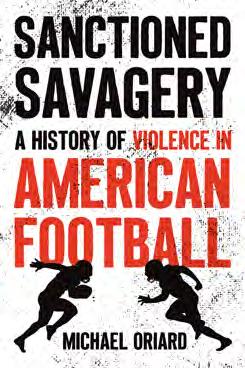


Fall2025/Winter
Browse our Fall/Winter 2025 catalog of books publishing between August 2025 and January 2026. All prices are subject to change without notice. Prices are US only and may be higher in the rest of the world.










Fall2025/Winter
Browse our Fall/Winter 2025 catalog of books publishing between August 2025 and January 2026. All prices are subject to change without notice. Prices are US only and may be higher in the rest of the world.






Amy Erdman Farrell
Wheneight-year-oldAmyErdmanFarrellmovedwithherfamilytoAkron, Ohio, in 1972, she found herself adrift in a sea of taunting boys and mean girls. Shy by nature, she dreaded her long, unhappy days at school. But a few years later, Farrell found an escape from bullying, the promise of sisterhood, a rising sense of confidence, adventure, and—best of all—lifelong friendship when she joined a Girl Scout troop. Decades later, award-winning author Farrell returns to those formative experiences to explore the complicated and surprising history of the Girl Scouts of the USA.
Drawing from extensive archival research, visits to iconic Girl Scout sites around the world, and vivid personal reflections, Farrell uncovers the Girl Scouts intricate history, revealing how the organization has shaped the lives of more than 50 million girls and women since its founding in 1912. With Farrell as our own intrepid guide, we travel to American Indian Boarding Schools, Japanese American incarceration centers, segregated African American communities, middle-class white neighborhoods, and outposts throughout the globe. IntrepidGirlsunpacks how the Girl Scouts navigated tensions over feminism, race, class, and political differences, carving out extraordinary opportunities for girls and women—even as it participated in the very discrimination it promised to transcend.
For anyone who has ever worn a uniform or wondered about the hidden history behind this iconic American institution,IntrepidGirlswill surprise, inspire, and challenge what we think we know about the Girl Scouts.
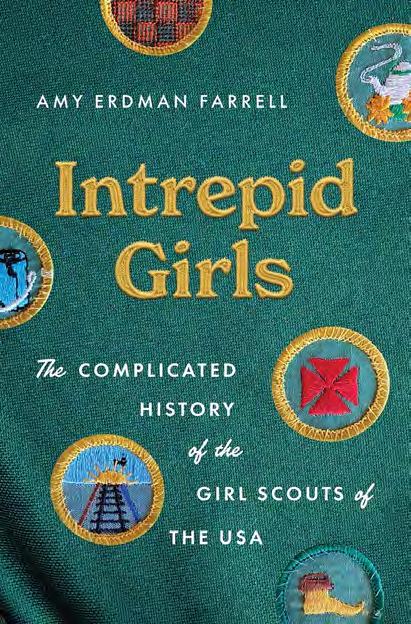
October 2025
$35.00 t
ISBN: 9781469686837
Hardcover
320 Pages
33 halftones, notes, bibl., index 9.250 in H | 6.120 in W | 1.000 inT
History / United States
A Ferris and Ferris Book

Amy Erdman Farrell is professor of American studies and women’s, gender, and sexuality studies and the James Hope Caldwell Memorial Chair of American Culture at Dickinson College.
“This eye-opening account is the first comprehensive history of the Girl Scouts from their inception in the 1910s to the earlytwenty-first century.Thescantattentionpaidtoanorganizationthathasofferedextracurricularactivitiesto more than fifty million American girls is hard to explain and even harder to accept. The stakes are high, and this book blends analysis and autobiographical reflection in an exemplary manner.”
—Mischa Honeck, author of Our Frontier Is the World: The Boy Scouts in the Age of American Ascendancy
“As someone who writes about US girls' organizations, I wish that Farrell’s findings would have been available when I was writing my book! Rich, detailed, and multifaceted, Farrell [’s work] captures complex ideas in succinct, accessible prose.”
—Jennifer Helgren, author of The Camp Fire Girls: Gender, Race, and American Girlhood, 1910-1980
Alice Gerrard
A trailblazing musician, in her own words
Alice Gerrard, an award-winning and storied folk and bluegrass musician for over 50 years, is one of the notable few women in a heavily male genre.Custom MadeWomantells Gerrard’s story through the music, the folk festivals, the kids, and the relationships—both personal and professional—that defined her storied life and career. Her collaborations with Appalachian singer Hazel Dickens during the 1960s and 1970s were pivotal recordings during the decades after the American folk music boom of the midcentury; the duo produced four albums that have recently been rereleased by Rounder Records and Smithsonian Folkways. In addition to Dickens, Gerrard has worked with folks like Tommy Jarrell, Enoch Rutherford, Otis Burris, Luther Davis, and Matokie Slaughter, and foundedTheOld-TimeHerald, based in Durham, North Carolina, serving as its editor-in-chief from 1987 until 2003.
She’s also a lifelong documentarian of the folkways scene, and this book features nearly 100 rare photos—many never before seen—of key musicians, including Doc Watson, Bill Monroe, Hazel Dickens, Elizabeth Cotten, Mike Seeger, and more. In telling the story of her time as a player of traditional music, Gerrard gives us a deeply personal way to understand and appreciate a quintessentially American genre that has a long history andthrivestothisday.

December2025
$35.00 t ISBN: 9781469690360 Hardcover 192 pages 94 halftones 10.000 in H | 7.000 in W | 1.000 inT
Music / Ethnomusicology
American Music: New Roots
Alice Gerrard is a Grammy-nominated old-time and bluegrass musician whose career has spanned nearly six decades.
“As a 'pioneering woman of bluegrass,' the founder of The Old-Time Herald, and musical collaborator with the likes of Hazel Dickens, Mike Seeger, Tommy Jarrell, and Elizabeth Cotten, Alice Gerrard has played a defining role in the evolution and transmission of American traditional music. Through stories of the many musicians who nurtured her, plucky personal reflections, and stunning photographs, Gerrard offers us a generous and intimate view of her remarkable life at the forefront of the old-time music revival.”
—Emily Hilliard, author of Making Our Future
Sylvester Allen Jr. and Belle Boggs
Wyatt Outlaw’s story was one of Black success: He was a Union League leader, business owner, and the first Black town constable and commissioner in Graham, a small town located in North Carolina’s Alamance County. But in 1870, Outlaw was murdered by the Ku Klux Klan, setting off a dramatic series of events: more lynchings, a Republican-led “war” against the Klan, and a white supremacist crackdown on Black political power that continues today. As a child, Black activist, musician, and Graham native Sylvester Allen frequently passed the site where Outlaw was killed without ever learning his name. Belle Boggs, white and also from the South, taught high school in Alamance County without knowing Outlaw’s importance.
Allen and Boggs both sought to discover why Outlaw had been erased from mainstream history books. InTheLegendofWyattOutlaw,theyshare what they found in artful detail and connect Outlaw’s storytothe violence against Black people in Alamance and throughout the United States, from Reconstruction through Jim Crow, the civil rights era, and Black Lives Matter. Drawing on archival research, interviews, and their own personal stories, Allen and Boggs join the conversation begun by historian Peniel Joseph and activist William Barber II about a third Reconstruction in America,buttheyalsoofferwaysto moveforwardforanycommunity struggling with a history of racism.
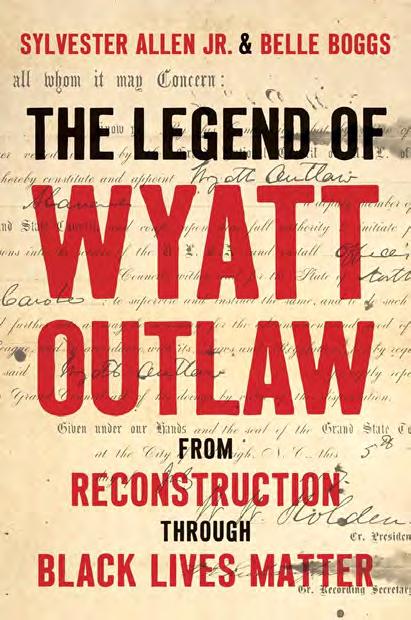
January 2026
$30.00 t ISBN: 9781469689999 Hardcover
288 pages 25 halftones
9.250 in H | 6.120 in W | 1.000 inT
History / United States
A Ferris and Ferris Book

Sylvester Allen Jr. is a writer, composer, and director based in Graham, North Carolina.
Belle Boggs is professor of English at North Carolina State University, and author of several books, includingTheGulfandTheArtofWaiting:OnFertility, Medicine,andMotherhood.
“A powerful and much-needed antidote to our long-accepted, and now invigorated, ignorance. Sylvester Allen Jr. and Belle Boggs have given us a deeply researched, fierce remembrance of Outlaw. Their mission is rooted in the premise that stories can’t be healed, or compensated for, or knowingly endured, rather obviously, until they are uprooted and learned. You can’t depart from these pages without a deepened understanding of our imperfect ability to comprehend ourselves. That lesson is crucial to our present challenges—North Carolina needs this book. I'm confident that, given the tenor of the times, the nation does as well.”
—Gene R. Nichol, author ofLessonsfromNorthCarolina:Race,Religion,Tribe,andtheFutureofAmerica
Maria Pinto
A beautiful examination of nature and human connection
Naturalist, forager, and educator Maria Pinto offers a stunning debut book that uncovers strange and beautiful fungal connections between the natural and human worlds. She mingles reportage, research, memoir, and nature writing, touching on topics that range from Black farmers' domestication of the unforgettable aroma of truffles to the history of mycological poisons wielded by enslaved people against their enslavers.
Pinto brings a new perspective and a distinctive literary voice to this mix of environmental and lived history, and every page sings with her enthusiasm for the networks in which we are embedded: fungal, ecological, ancestral, and communal. Join her in pursuit of beautiful, perplexing, delicious, and deadly mushrooms as she explores this understudied kingdom’s awe-inspiring diversity and discovers how fungi have been used by people, especially those on the margins, for survival, pleasure, revelation, and revolution.

October 2025
$23.00 t ISBN: 9781469689791
Paperback
240 pages 8.500 in H | 5.500 in W | 1.000 inT
Literary Collections / Essays
GreatCircleBooks
Maria Pinto is a Boston-area writer, mycophile, and educator who was born in Jamaica and grew up in South Florida.
“Reading Maria Pinto’sFearless,Sleepless,Deathless, I am stopped in my tracks again and again—admiring a string of lusciously juxtaposed words, laughing out loud at a slice of irony, thrilling at the syntax, the sentences—as her language carries, and often almost sings, the beauty and mystery and puzzlement and danger and invention and entanglement and fecundity and wonder of the mycological. And themycophilic.Ihaverarelyencountered such beautiful writing. I have rarely encountered such a beautiful book.”
—Ross Gay, author ofTheBookof(More)Delights
“The most daring and poignant book about fungi I've ever read. Fascinating and gorgeously written, while also being darkly funny—Pinto’s prose is powerfully personal and vivid. Reading it made me ache to get up and wander into the woods.”
—Belle Boggs, author of TheGulfandTheArtofWaiting:OnFertility,Medicine,andMotherhood
The Biology and Conservation of North America's Favorite Crustaceans
Zackary A. Graham
The amazing story of an unassuming crustacean
Whatever you call them—crayfish, crawfish, or crawdads—these small crustaceans are a vital piece of the larger ecosystem, and though they're found nationwide, the American Southeast and Appalachia are among the most biodiverse places for these animals. Biologist and crayfish expert Zackary Graham takes readers on an informative journey, following crayfish from the coalfields of Central Appalachia to the spring-fed water of Northern California, and in roadside ditches everywhere in between. He discusses crayfish habitats— the muddier the better—anatomy, and coloration, which runs the gamut from dull grays to vivid blues, reds, and evenbrightwhite.
Most important, Graham shows how necessary crayfish are to our ecosystem and rallies a call for protection as nearly 200 of the 400 unique species of crayfish in the United States are threatened by development, pollution, and other humanmade factors. A love letter to a common crustacean, this book shows nature lovers that crayfish are diverse, important, and in need of our help.

January 2026
$28.00 t ISBN: 9781469685731
Paperback
248 pages
81 color plates., 2 drawings, 2 maps
9.000 in H | 6.000 in W | 1.000 inT
Nature / Animals
“An exciting book that teaches us about crayfish while also showing us what it takes to be a field biologist. Zackary Graham’s gift of storytelling, sharing his own personal story along with that of the crayfish, will captivate readers of all ages.”
—Georgann Eubanks, author ofTheFabulousOrdinary:DiscoveringtheNaturalWondersoftheWildSouth
“An engaging overview of freshwater crayfish from the standpoint of an early-career biologist, and his enthusiasm and passion for this group of invertebrates are infectious. The story really makes clear the importance of crayfish to aquatic and terrestrial ecosystems, and their impact (both positive and negative) on other species. Aimed at everyday readers, this story is perfect for anyone who loves nature and wants to find out just how interesting, diverse, and important these humble creatures are to our world.”
—James W. Fetzner Jr., Carnegie Museum of Natural History
Michael Oriard
American football was a violent sport from its beginning as a college game in the 1870s and 1880s, in part because learning how to deal with the pain and violence, to “take it,” mademenoutofcollegeboys.MichaelOriard, former NFL linebacker and professor emeritus of English, shows us that this fundamental belief persisted for more than a century, until signs of chronic traumatic encephalopathy (CTE) were found in Pittsburgh Steelers' center Mike Webster’s brain. Suddenly, the cost of “taking it” could mean long-term damage not just to the body but also to the brain. Without anyone knowing it, that risk had soared since the 1950s and 1960s, when the hardshell plastic helmet became the primary weapon for blocking and tackling, as taught by a new generation of college coaches, led by the UniversityofAlabama’sBearBryant.
In this cultural history of football at nearly all levels—high school, college, and pro—Oriard traces the perennial tension between health and culture regarding football as reflected in what the public read in newspapers, magazines, and online. Through examining how we once felt and how we now feel about the game, Oriard challenges us to grapple with the possibility that football might be tooviolent,inanintolerableway.

September 2025
$30.00 t
ISBN: 9781469690643
Hardcover
304 pages
25 halftones, notes, index
9.250 in H | 6.120 in W | 1.000 inT
Sports & Recreation / History
Michael Oriard is Distinguished Professor Emeritus of American Literature and Culture and former Associate Dean of the College of Liberal Arts at Oregon State University. He was offensive captain and a second-team All-American at the University of Notre Dame and played four years with the Kansas City Chiefs.
“From Oklahoma drills to coaches and spectators encouraging players to 'dish out' punishment on the field, the history of football has been steeped in the celebration of pain and injury. Michael Oriard explores fundamental questions about Americans' changing comfort levels with violence, which has very real and debilitating health consequences.”
—Kathleen Bachynski, author ofNoGameforBoystoPlay
Amrita Chakrabarti Myers
RestoringJuliaChinntoherrightful
Award-winning historianAmrita Chakrabarti Myers hasrecovered theriveting, troubling, and complicated story of Julia Ann Chinn (ca. 1796–1833), the enslaved mixed-race wife of Richard Mentor Johnson, owner of Blue Spring Farm,veteranof theWarof1812,andUSvicepresidentunderMartinVan Buren. Johnson never freed Chinn, but during his frequent absences from his estate, he delegated to her the management of his property, including Choctaw Academy, a boarding school for Indigenous men and boys. This meant that Chinn had substantial control over economic, social, financial, and personal affairs within the couple’s world, including overseeing Blue Spring’s enslaved labor force. Chinn’s relationship with Johnson was unlikely a consensual one since she was never manumitted.

August 2025
$24.00 t ISBN: 9781469692098
Amrita Chakrabarti Myers is the Ruth N. Halls Associate Professor of History and gender studies at Indiana University Bloomington. She is the author of Forging Freedom: Black Women and the Pursuit of Liberty in Antebellum Charleston.
Paperback
296 pages 20 halftones, 1 map, 1 graph, notes, bibl., index 9.250 in H | 6.120 in W | 1.000 inT
Social Science / Ethnic Studies
AFerrisandFerrisBook

“MyerscarefullystitchestogetherthestoryofJuliaAnnChinn,theenslavedwifeofRichardMentorJohnson,Martin Van Buren’s vice president, recounting her life on his estate and the public controversy over their relationship.”
NewYorkTimesBookReview
“Illuminating. . . . Myers painstakingly pieces together this long-hidden history. The result is a revealing exploration ofthe intersectionofrace,gender,power,andpropertyineighteenth-centuryAmerica.”
PublishersWeekly
“The [fascinating] story of a remarkable woman who experienced freedom and slavery simultaneously. . . . Myers has conducted arduous research, and she ably introduces a little-known yet important figure in American history . . . . A valuable addition to antebellum history.”
KirkusReviews
“Groundbreaking....Adeeplyresearchedandelegantlywrittenbiography.” Ms.magazine
SandraA.Gutierrez
Vibrantflavors,comfortingdishes,many cultures,andonenewfood movement
In this splendid cookbook, bicultural cook Sandra Gutierrez blends ingredients, traditions, and culinary techniques, creatively marrying the diverse and delicious cuisines of more than twenty Latin American countries with the beloved food of the American South. The book has beautiful illustrations and features 150 original recipes, a handy glossary, a section on how to navigate a Latin tienda, and a guide to ingredient sources.
Born in the US, Sandra A. Gutierrez is a bilingual, award-winning journalist, food historian, professional cooking instructor, and author of six cookbooks. She is considered one of the top national experts on Latin American Foodways and on the United States Southern Regional cuisine, and she is one of only a handful of cooks to have discovered a culinary movement in the US (the New SouthernLatino movement, 1996). In 2021, Gutierrez was honored by the Smithsonian Institute as a Woman to Know and one of the seven Latinas Who Shaped American Culture. Her most recent book is Latinísmo: Home Recipes from the TwentyOne Countries of Latin America. She lives in Cary, North Carolina.

$25.00 t ISBN: 9781469692074
Paperback
320 pages 20 color illus., bibl., index 8.380 in H | 7.620 in W | 1.000 inT
Cooking / Regional & Ethnic
“Gutierrez’s approach to cooking reflects the fusion of both cultures.” LibraryJournal
“A beautiful marriage of cultures.”
USATodayHispanicLiving
“Few authors are so thoroughly integrated into a cookbook. . . . Her personality is palpable throughout. Using the book is almost like having Gutierrez beside you in your kitchen.”
—Damon Lee Fowler,SavannahMorningNews
“A wonderful cookbook and a fact-filled guide to the fusion of Southern and Latino cooking. . This skillful foray into the cuisine of the Americas . . . is a tremendously valuable addition to the bookshelves of both serious and casual cooks.” ForeWord
Kristina R. Gaddy, Rhiannon Giddens
The roots of African American music made accessible and playable for the first time in one place
For the first time, this groundbreaking songbook collaboration by music writer
Kristina R. Gaddy and Grammy Award winner Rhiannon Giddens makes nineteen examples of early Black Atlantic music accessible and playable for today’s musicians, music enthusiasts, and historians. Presenting music from 1687 through the 1860s in modern treble clef and banjo tablature, along with the rich stories behind each song, Gaddy and Giddens take readers on a journey from the Caribbean across the Americas.
Immensely readable for amateurs and professionals alike,GoBackandFetchIt explains the significance of early Black Atlantic music and how the patterns of tunings, melodic lines, and lyrics shed light on the impact that Black American music has had on nineteenth-century popular music, early country, old time, and bluegrass. Each tune pairs with an engaging essay on its historical background and how the tune transformed over time, as well as information about the collector. Deeply researched and carefully approached, this essential source restores the roots of Black music to the musical canon.

September 2025
$19.95 s ISBN: 9781469690575
Paperback
120 pages 29 halftones, notes, bibl., index 11.000 in H | 8.500 in W | 1.000 inT
Music / Ethnomusicology
Kristina R. Gaddy is the author ofWellofSouls:UncoveringtheBanjo’sHidden History, among other books of nonfiction.
Rhiannon Giddens is a Grammy Award–winning singer, instrumentalist, and composer,aMacArthurrecipient,andaPulitzerPrizewinner.
“This volume beautifully showcases the rich diversity of Afro-Atlantic music in a welcoming and accessible way. All those who love and play this music should get this book!”
—Laurent Dubois, author of TheBanjo:America’sAfricanInstrument
“Giddens and Gaddy have threaded music scholarship’s most troublesome needle, making the tunes more accessible than ever before without simplifying, distorting, or discarding the important history that comes with them.”
—Jake Blount, musician and interpreter of Black folk music
Marion Orr
ABlackcongressman'sfightforcivilrights,fromEmmettTilltoantiapartheid activism
At the height of the civil rights movement, Charles C. Diggs Jr. (1922–1998) was the consummate power broker. In a political career spanning 1951 to 1980, Diggs, Michigan’s first Black member of Congress, was the only federal official to attend the trial of Emmett Till’s killers, worked behind the scenes with Martin Luther King Jr., and founded the Congressional Black Caucus. He was also the chief architect of legislation that restored home rule to Washington, DC, and almost single-handedly ignited the American anti-apartheid movement in the 1960s. Drawing on extensive archival research, including Diggs’s rarely seen personal papers, FBI documents, and original interviews with family members and political associates, political scientist Marion Orr reveals that Diggs practiced a politics of strategic moderation. Orr argues that this quiet approach was more effective than the militant race politics practiced by Adam Clayton Powell and more appealing than the conservative Chicago-style approach of William Dawson—two of Diggs’s better-known Black contemporaries.
Vividlywrittenanddeeplyresearched,HouseofDiggsis the first biography of Congressman Charles C. Diggs Jr., one of the most consequential Black federal legislators in US history. Congressman Diggs was a legislative lion whose unfortunate downfall punctuated his distinguished career and pushed him and his historic accomplishments out of sight. Now, for the first time,Houseof Diggsrestores him to his much-deserved place in the history of American politics.
Marion Orr is the Frederick Lippitt Professor of Public Policy and professor of political science and urban studies at Brown University.

September 2025
$29.95 s ISBN: 9781469689326
Paperback
360 pages
28 halftones, notes, bibl., index
9.250 in H | 6.120 in W | 1.000 inT
Social Science / Ethnic Studies
Justice,Power,andPolitics
“An unmatched and wonderfully complex exploration of Charles Diggs Jr. Marion Orr has probed, explored, and added a great deal to our understanding of many different areas of politics.”
—Dianne Pinderhughes, coauthor ofContestedTransformation:Race,Gender,andPoliticalLeadershipin21stCentury America
“The best full-scale assessment of Diggs’s remarkable career that I know of. HouseofDiggsprovocativelyand compellingly demonstrates Marion Orr’s claim that no other Black member of Congress can match the tangible impact of Diggs’s life and work.”
—Waldo E. Martin Jr., author ofNoCowardSoldiers:BlackCulturalPoliticsinPostwarAmerica
Jessica M. Lepler
Afailedquesttobuildtheworld'sfirstinteroceaniccanal
In the 1820s, there was a little-known quest to unite the world by building a waterway between the Atlantic and Pacific Oceans. As new Spanish American nations declared independence and new canals intensified US expansion and British industrialization, many imagined the construction of an interoceanic canal as predestined. With dreams substituting for data, an international cast of politicians, lawyers, philosophers, and capitalists sent competing agents on a race to transform Lake Nicaragua, the San Juan River, and the terra incognita of Central American forests into the world’s first waterway.
Jessica Lepler tells the captivating story of this global journey inCanal Dreamers. Although the idea of literally changing the world by connecting the oceansproved toorevolutionaryfortheAgeofRevolution,thequest itself changed history. Canal dreams prompted political transformations, financial crisis, recognition of new countries, concern about climate change, and more. Full of adventure, corruption, far-reaching consequences, and present-day parallels, Lepler’s absorbing narrative cuts through two centuries, revealing that dreams do not need to come true to make history.

August 2025
$29.95 s ISBN: 9781469690551
Paperback 368 pages 15 halftones, 3 maps
9.250 in H | 6.120 in W | 1.000 inT
History / United States
Jessica M. Lepler is associate professor of history at the University of New Hampshire.
“There’s a very real transcendent, mythic, and literary quality to Lepler’s writing. She pushes the boundaries of historical inquiry, all the while doing so with her customary style and verve.”
—Brian Rouleau, author ofWithSailsWhiteningEverySea:MarinersandtheMakingofanAmericanMaritimeEmpire
“CanalDreamerspromises to recover both the prehistory of a familiar tale—the building of an isthmian canal—and a lost moment in the history of the Americas. Simply, it is a pleasure to read.”
—Nicholas Guyatt, author of BindUsApart:HowEnlightenedAmericansInventedRacialSegregation
Anne E. Marshall
Thelifeofacolorful,complicatedAmericanreformer
The nineteenth-century Kentucky antislavery reformer Cassius Marcellus Clay is generally remembered as a knife-wielding rabble-rouser who both inspired and enraged his contemporaries. Clay brawled with opponents while stumping for state constitutional changes to curtail the slave trade. He famously deployed cannons to protect the office of the antislavery newspaper he founded in Lexington. Despite attempts on his life, he helped found the national Republican party and positioned himself as a staunch border state ally of Abraham Lincoln. During the Civil War, he served as US minister to Russia, working to ensure that European allies would not recognize the Confederacy. And yet he was a slave owner until the end of the Civil War. Though often misremembered as an abolitionist, Clay was like many Americans of his time: interested in a gradual end to the institution of slavery but largely on grounds that it limited whites' ability to profit from free labor and the South’s opportunity for economic advancement. In the end, Clay’s political positions were far more about protecting members of his own class than advancing the cause of Black freedom.
This vivid and insightful biography reveals Cassius Clay as he was: colorful, yes, but in many ways typical of white Americans who disliked slavery in principle but remained comfortable accommodating it. Reconsidering Clay as emblematic rather than exceptional, Anne E. Marshall shows today’s readers why it took a violent war to finally abolish slavery and why African Americans' demands for equality struggled to gain whitesupportaftertheCivilWar.

September 2025
$39.95 s
ISBN: 9781469690995
Hardcover
336 pages
12 halftones, notes, bibl., index
9.250 in H | 6.120 in W | 1.000 inT
History / United States
Civil War America
Anne E. Marshall is associate professor of history and executive director of the Ulysses S. Grant Presidential Library at Mississippi State University.
“In Marshall’s capable hands, Cassius M. Clay emerges from beneath layers of myth and misremembrance as both a defiant individualist and an emblem of many white Americans' ideas about slavery in the Civil War era.”
MichaelE.Woods,authorofArguinguntilDoomsday:StephenDouglass,JeffersonDavis,andtheStrugglefor AmericanDemocracy
Joe William Trotter Jr.
AmasterfulexplorationoftheintersectionofAfricanAmericanlabor, urbanhistory,andmedicalhistory
During the COVID-19 pandemic, commentators opined that the high concentration of African Americans in dangerous and unsafe work and living environments exposed them to the virus at higher and more deadly rates than their Euro-American counterparts. InFromEnslavementtoCOVID-19, Joe William TrotterJr. delvesinto the historicalcontext ofthis phenomenon.
Focusing on four historical periods—enslavement, emancipation, the industrial era, and the digital age—Trotter argues that rather than being anomalous, the fight for adequate health care and beneficial social service policies follows a similar trajectory as the movement of Black people from enslavement to freedom. The book emphasizes how the labor requirements of work shaped the African American encounter with disease; how white medical professionals developed stereotypes about the susceptibility of Black people to sickness; and how those professionals denied essential medical care to the country’s most vulnerable. Trotter also highlights how people of African descent drew on their legacy of activism and community-building to improve their physical and mental conditions, creating programs and strategies to combat inequality and discrimination in the nation’s health care system.
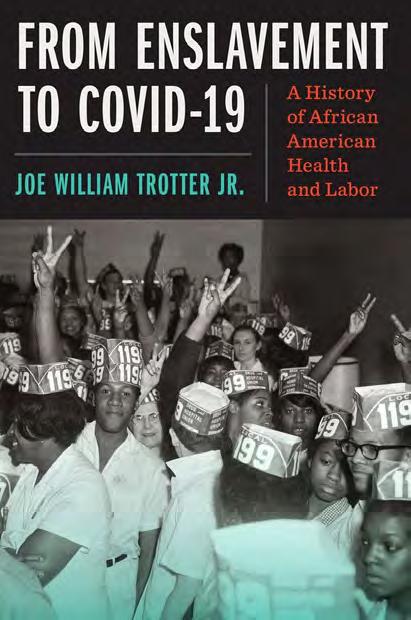
October 2025
$24.95 s ISBN: 9781469690858
Paperback
224 pages 10 halftones
9.250 in H | 6.120 in W | 1.000 inT
Social Science / Ethnic Studies
JoeWilliamTrotterJr.is Giant Eagle University Professor of History and Social Justice at Carnegie Mellon University.
“Trotter is a brilliant historian, and his deep knowledge of labor, African American history, and urban history shows here, overandover.”
—SusanM.Reverby,authorofExaminingTuskegee:TheInfamousSyphilisStudyandItsLegacy
“With a global pandemic not far behind us, Trotter’s sweeping and thorough history of the ways African Americans fought to secure their physical and mental wellbeing, even as they fought for civil and economic rights is timely as ever.”
—EarlLewis,authorofInTheirOwnInterests:Race,Class,andPowerinTwentieth-CenturyNorfolk,Virginia
Renata Keller
Despite twenty-first-century fears of nuclear conflagrations with North Korea, Russia, and Iran, the Cuban Missile Crisis is the closest the United States has come to nuclear war. That history has largely been a bilateral narrative of the USUSSR struggle for postwar domination, with Cuba as the central staging ground —a standard account that obscures the shock waves that reverberated throughout Latin America. This first hemispheric examination of the Cuban Missile Crisis shows how leaders and ordinary citizens throughout theregion experienced it, revealing that,hadthe missiles been activated, millions of people across Latin America would havebeenatgraverisk.
Traversing the region from the Southern Cone to Central America, Renata Keller describes the deadly riots that shook Bolivia when news of the Cuban Missile Crisis broke, the naval quarantine that members of Argentina’s armed forces formed around Cuba, the pro-Castro demonstrations organized by Nicaraguan students, and much more. Drawing on a vast array of archival sources from around the hemisphere and world,TheFateoftheAmericasdemonstrates that even at the brink of destruction, Latin Americans played active roles in global politics and inter-American relations.
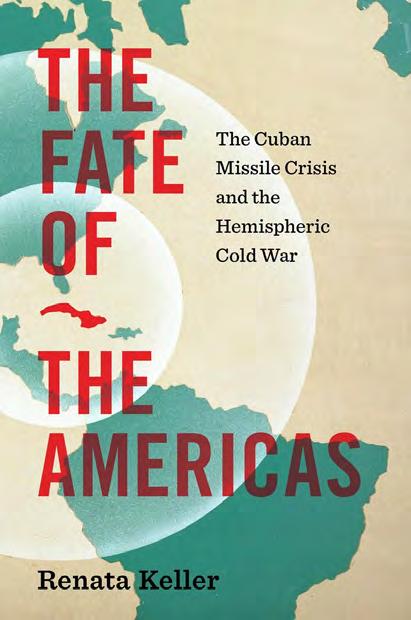
$29.95 s
ISBN: 9781469689432
Paperback
336 pages
26 halftones, 1 maps, notes, bibl., index
9.250 in H | 6.120 in W | 1.000 inT
History / Modern / 20th Century
InterConnections:TheGlobal Twentieth Century
Renata Keller is associate professor of history at the University of Nevada, Reno.
“Renata Keller broadens our perspective on the Cuban Missile Crisis by examining Latin Americans before, during, and after the US discovery of missiles on that communist island. Everyone concerned about international relations should read this book.”
—Alan McPherson, author of TheBreach:Iran-ContraandtheAssaultonAmericanDemocracy
“This outstanding work completely transforms our understanding of the Cuban Missile Crisis. Keller’s gripping narrative moves expertly from tense negotiations behind closed doors in Washington and Havana to explosive street protests in Buenos Aires and Montevideo.”
—Michelle Chase, author ofRevolutionwithintheRevolution:WomenandGenderPoliticsinCuba,1952–1962
William J. Schultz
IntheyearsafterWorldWarII,Americanevangelicalsflockedtotheonce-sleepy mountain town of Colorado Springs. Drawn by cheap property, beautiful scenery, and the encouragement of civic leaders who saw religion as a path to prosperity, evangelicals planted new churches and built religious nonprofits with a global reach. They preached their message in churches and schools, even in the United States Air Force Academy. Their efforts transformed the city into what some called the “Evangelical Vatican” and others dubbed “Jesus Springs.” But in the early 1990s, as the evangelical movement shifted its focus from saving souls to securing political and economic power, relations between the movement and the localcommunityfractured.Todaythecityfacestheprospectofreinvention, grappling with the challenges of America’s fast-changing religious landscape.
JesusSpringsreveals the power and influence of American evangelicalism within the nation’s spiritual economy. Linking the Cold War and the culture wars, William J. Schultz tracks how a deluge of defense spending helped Colorado Springs become the organizational heart of American evangelicalism. This story, taking place as evangelicalism transformed from a primarily religious movement into the social and political force we know today, illuminates the movement’s potential impact as its participants seek ever-greater power.

October 2025
$29.95 s ISBN: 9781469689371
Paperback
224 pages
8 halftones, notes, bibl., index
9.250 in H | 6.120 in W | 1.000 inT
Religion / Christian Ministry
William J. Schultz is assistant professor of American religions at the University ofChicagoDivinitySchool.
“This fresh, insightful book offers a valuable perspective on modern American evangelicalism and its cultural politics. Schultz’s case study of Colorado Springs will be of great interest to readers who are seeking a better understanding of the rise of the Christian Right.”
—Daniel K. Williams, Ashland University
Katie Batza
TheuntoldhistoriesofAIDSintheMidwest
Histories of AIDS in the United States typically consider San Francisco and New York the epicenters of the crisis. The Midwest, if considered at all, appears as a footnote to the social, medical, and political struggles of coastal queer communities. But the US heartland cultivated its own regionally distinct strategies of survival that became the surprising and lasting blueprint for LGBTQ politics today. Unearthing this complex story, healthactivismexpertKatieBatza masterfullyillustratesthediversity, resilience, innovation, and influence of the Midwest’s response to the AIDS epidemic.
Though AIDS cases were relatively low, the conservative political and religious landscape, lack of medical infrastructure, and diffuse gay communities brought Midwesterners together in unexpected ways. Weaving compelling oral histories with remarkable archival research, Batza sheds light on the moving stories of a constellation of essential responders that included crop duster pilots, church van drivers, nuns, tribal leaders, and synagogue ladies in decommissioned convents, backyard barbeques, high school gyms, and city parks. These unique collaborations fostered loud, radical queer politics and homonormative strategies alike, but the myth of a homogenously white, Christian, and heterosexual heartland endured. In AIDS in the Heartland,Batzacontendsthatthe respectability and palatability of the heart of the nation prevail as core values in national LGBTQ political strategies today. Just as in the heart of the nation, Batza contends, respectability and palatability prevail as core values in national LGBTQ political strategies today.

October 2025
$24.95 s ISBN: 9781469690490 Paperback
192 pages 10 halftones
9.250 in H | 6.120 in W | 1.000 inT
Social Science / Gender Studies
Katie Batza is chair of women, gender, and sexuality studies at The University of Kansas and author of Before AIDS: Gay Health Politics in the 1970s
“EssentialreadinginHIV/AIDSandqueerhistory.Animportant,innovative,andengagingcontribution.”
—EmilyK. Hobson, author ofLavenderandRed:LiberationandSolidarityintheGayandLesbianLeft
“Katie Batza’s groundbreaking history of the HIV/AIDS crisis in the American heartland will reshape how we talk about AIDSintheUnitedStates.Weneedthisbook!”
—AnthonyM.Petro,authorofAftertheWrathofGod:AIDS,Sexuality,andAmericanReligion
Thomas Hal Phillips
Anunconventionalbutundeniablestoryofloveandfamilybetween men
Originally published in 1950, the long out-of-print novel The Bitterweed Path was rediscovered in 1996 with the support of John Howard's critical introduction. In the years since, new generations have witnessed its subtle yet daring contribution to Southern gay literature. This 75th anniversary edition includes a new foreword by John Howard and a new afterword by Harry Thomas Jr. that provide fresh insight into the workings of race, class, and queerness in this enduring novel.
In The Bitterweed Path, Thomas Hal Phillips vividly recreates rural Mississippi at the turn of the twentieth century. In elegant prose, he draws on the Old Testament story of David and Jonathan and writes of the friendship and love between two boys—one a sharecropper's son and the other the son of the landlord—and the complications that arise when the father of one of the boys falls in love with his son's friend. Defying stereotypes about both Mississippi and the 1950s, The Bitterweed Path challenges conceptions of the US South as a place devoid of queerness and reimagines it as alive with same-sex desire.
Thomas Hal Phillips (1922–2007) was a novelist, actor, and Hollywood screenwriter and consultant from Mississippi. His film work includes Nashville, The Autobiography of Miss Jane Pittman, Ode to Billy Joe, and Walking Tall II, and he authored the novels The Golden Lie, Search for a Hero, Kangaroo Hollow, and The Loved and the Unloved
John Howard is emeritus professor of arts and humanities at King’s College London and author of several books including Men Like That: A Southern Queer History.
Harry Thomas Jr. is an independent scholar based in Durham, North Carolina, and author of Sissy! The Effeminate Paradox in Postwar US Literature and Culture.
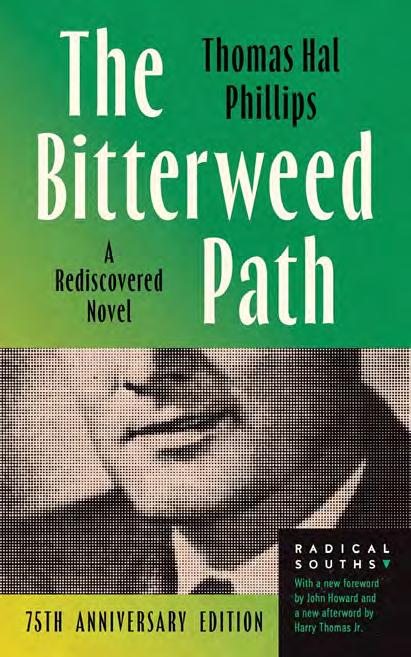
September 2025
$27.95 s ISBN: 9781469691763
Paperback
376 pages 8.000 in H | 5.000 in W | 1.000 inT
Fiction / Erotica
RadicalSouths
“A remarkable rediscovery. It is in itself a moving, subtle, skillful work of fiction. And its rare depiction of homoerotic relationships in an era in which the subject was largely tabooed redoubles the novel’s importance and impact. John Howard’s excellent introduction to the book, placing it in historical context, further adds to the importance of this publishing event.”
—Martin Duberman, author ofStonewall:TheDefinitiveStoryoftheLGBTQRightsUprisingThatChangedAmerica
“Lyrical, sexy, and fascinating—a haunting work of art from a time and psychological place that is illuminating to revisit in light of where the world is today.”
—Howard Cruse, author ofStuckRubberBaby
1715–1865
Antwain K. Hunter
NewnuancetooldgundebatesintheTarHeelState
Spanning the 1720s through the end of the Civil War, this book explores how free and enslaved Black North Carolinians accessed, possessed, and used firearms— both legal and otherwise—and how the state and white people responded. North Carolinians, whether free or enslaved, Black or white, had different stakes on the issue, all of which impacted the reality of Black people’s gun use.
Antwain K. Hunter reveals that armed Black people used firearms for a wide range of purposes: They hunted to feed their families and communities, guarded property, protected crops, and defended maroon communities from outsiders. Further, they resisted the institution of slavery and used guns both against white people and within their own community. Competing views of Black people’s firearm use created social, political, and legal points of contention for different demographics within North Carolina and left the general assembly and white civilians struggling to harness Black people’s armed labor for white people’s benefit.APrecariousBalancechallenges readers to rethink how they understand race and firearms in the American past.

November 2025
$32.95 s ISBN: 9781469689890 Paperback
320 pages
10 halftones, 1 figs., 1 maps, 3 tables, notes, bibl., index 9.250 in H | 6.120 in W | 1.000 inT
History /African American
Antwain K. Hunter is assistant professor of history at the University of North Carolina at Chapel Hill.
“No previous study has looked as carefully, thoroughly, or thoughtfully at the history of firearms in the South.” — Randolph Roth, author of AmericanHomicide
“The scholarly effort that went into building APrecariousBalanceis evident.”
—Sally Hadden, author ofSlavePatrols:LawandViolenceinVirginiaandtheCarolinas
Oscar Winberg
Delving into the intersection of television entertainment and American politics during the 1970s, focusing on the sitcomAllintheFamily, this book explores how political campaigns, social movements, and legislators leveraged the show’s popularity for their own agendas. From Archie Bunker’s reactionary bigotry, to Edith Bunker’s symbolic role in the Equal Rights Amendment campaign, and the show’s creator and producer Norman Lear’s defiance against government censorship, Oscar Winberg uncovers the profound impact of television on political strategies and institutions.
Oscar Winberg’s capacious research, including in Norman Lear’s private archive, shows howAllintheFamilyset the stage for today’s spectacle politics. It also reveals how politicians, from Richard Nixon to Hillary Rodham Clinton, skillfully utilized entertainment television to connect with audiences, demonstrating the evolution of personality politics that culminated in the political rise of Donald Trump. With a keen focus on the transformative power of television entertainment, this multifaceted history expands the discussion on the interconnected roles of media and politics, offering a new exploration into how one television show produced a profound cultural shift in American politics.

November 2025
$29.95 s ISBN: 9781469690902
Paperback
272 pages 12 halftones, notes, bibl., index 9.250 in H | 6.120 in W | 1.000 inT
History / United States
Oscar Winberg is a postdoctoral fellow at the Turku Institute for Advanced Studies and the John Morton Center for North American Studies at the University ofTurku.
“Exceptionally well-researched and engagingly written, this book highlights the transformative ways that entertainment television has intersected with, shaped, and influenced US political history.”
—Allison Perlman, UniversityofCaliforniaIrvine
Edited by Jennifer Putzi
In 1867, Frances Anne Rollin, a Black writer and teacher from South Carolina, traveled to Boston to seek a publisher for her biography of famed Black abolitionist, writer,andCivilWarveteranMartinR.Delany—thefirst full-length biography writtenbyan AfricanAmerican.BeginninginJanuary 1868, Rollin kept a diary while in Boston documenting her progression on Delany’s biography, negotiations with publishers, visits from friends, attendance at lectures and readings, and her marriage to William J. Whipper, a Black politician and jurist. Rollin’s diary is one of the earliest known diaries by a Southern Black woman.
In this critical edition Jennifer Putzi offers the first complete transcription and annotation of Rollin’s diary, along with a robust introduction providing important biographical, historical, cultural, and literary contexts for readers. Rollin’s diary provides one of the fullest pictures of an African American woman as an author, activist, and well-connected and politically involved individual during the Reconstruction era—filling a gap in the literature and scholarly analysis of such preserved works by nineteenth-century African American women.

October 2025
$29.95 s ISBN: 9781469690025
Paperback
304 pages 14 halftones, 1 maps, appends., notes, bibl., index 9.250 in H | 6.120 in W | 1.000 inT
Social Science / Ethnic Studies
Jennifer Putzi is the Sara and Jess Cloud Professor of English and Gender, Sexuality,andWomen’sStudiesatWilliam&Mary.
“The extraordinary nineteenth-century diary of Frances Anne Rollin documents the experiences of apolitically engaged Black woman who charts her literary ambitions and personal growth during a tumultuous period of social and cultural change. Jennifer Putzi’s expertly prepared critical edition is a major contribution to literary history and required reading for anyone who cares about African American history and autobiography.”
—Desirée Henderson, UniversityofTexasatArlington
Robert D. Bland
ReclaimingthelegacyofReconstruction'spioneeringgeneration
The promise of Reconstruction sparked a transformative era in American history as free and newly emancipated Black Americans sought to redefine their place in a nation still grappling with the legacy of slavery. Often remembered as a period of failed progressive change that gave way to Jim Crow and second-class citizenship, Reconstruction’s tragic narrative has long overshadowed the resilience and agency of African Americans during this time.
RequiemforReconstructionchronicles Reconstruction’s legacy by focusing on key Black figures such as South Carolina congressman Robert Smalls, Judge William Whipper, writer Frances Rollin, and others who shaped postbellum Black America. Robert D. Bland traces the impact of the Reconstruction generation—Black Americans born between 1840 and 1870 who saw Reconstruction as a defining political movement and worked to preserve its legacy by establishing a new set of historical practices such as formulating new archives, shaping local community counternarratives, using the Black press to inform national audiences about Southern Republican politics, and developing a framework to interpret the recent past’s connection to their present world. Set in South Carolina’s Lowcountry—a hub of Black freedom, landownership, and activism—this book shows how late nineteenth-century Black leaders, educators, and journalists built a powerful countermemory of Reconstruction, defying the dominant white narrative that sought to erase their contributions.

January 2026
$34.95 s
ISBN: 9781469691879
Paperback
304 pages
26 halftones, 11 maps
9.250 in H | 6.120 in W | 1.000 inT
Social Science / Ethnic Studies
TheJohnHopeFranklinSeries in AfricanAmericanHistoryand Culture
Robert D. Bland is assistant professor of history and Africana studies at the University of Tennessee.
“This book’s exploration of the Reconstruction generation and the Black countermemory it built is a groundbreaking contribution to the field, successfully integrating Civil War and Reconstruction scholarship with AfricanAmerican politicalandintellectualhistory.Itisanimportant,insightful,andexcitingwork.”
—AmyMurrell Taylor,authorofEmbattledFreedom:JourneysthroughtheCivilWar’sSlaveRefugeeCamps
Aaron G. Fountain Jr.
Teenspirit,radicalchange
Mid-twentieth-century student activism is apivotal chapter in American history. While college activism has been well documented, the equally vital contributions of high school students have often been overlooked. Only recently have scholars begun to recognize the transformative role teenagers played in reshaping American education.
HighSchoolStudentsUnite!highlights the crucial impact of high school activists in the 1960s and 1970s. Inspired by civil rights and antiwar movements, students across the nation demanded a voice in their education by organizing sit-ins, walkouts, and strikes. From cities such as San Francisco and Chicago to smaller towns such as Jonesboro, Georgia, these young leaders fought for curricula that reflected their evolving worldviews. Drawing on archival research and interviews, Aaron G. Fountain Jr. reveals how teenagers became powerful agents of change, advocating for constitutional rights and influencing school reform. Ironically, the modernization of school security, including police presence, was partly a response to these student-led movements. Through oral histories and FBI records, this fascinating history offers a fresh perspective on high school activism and its lasting impact on American education.

December2025
$34.95 s ISBN: 9781469691824 Paperback
400 pages 12 halftones, appends., notes, bibl., index 9.250 in H | 6.120 in W | 1.000 inT
Social Science / Ethnic Studies
“By centering the political engagement of high school students, this book provides fresh insight into social movements and educational reform, making a vital contribution to the study of activism in times of upheaval and change.”
—Gregg
Michel,UniversityofTexasatSanAntonio
James O'Neil Spady
UncoveringthehiddenhistoryoftheDenmarkVesey
In 1822, Black Charlestonians attempted to overthrow slavery. Theywere exposed before they could strike, and many were tried and executed in what has come to be known as the Denmark Vesey Affair. Take Freedom reinterprets these events on the basis of new evidence and methods. James O’Neil Spady narrates the roles of a variety of Black men and women, arguing that the uprising was a broadly based, African-influenced social movement that marshaled radical love and fugitive practices of freedom to ignite a revolution that sought to liberate beloved friends, families, and communities from increasingly aggressive and racializing slaveowners.
Uncovering never-before-consulted, unpublished documents, Spady names the clerk who made the trial records and settles old arguments about their reliability. Take Freedom demonstrates the realism of the uprising movement’s strategy and uses social network mapping to illustrate the social dynamics within the Black community, emphasizing the roles of women and relationships among enslaved people. Ultimately, this book offers a more inclusive and accurate portrayal of this pivotal yet understudied revolutionary movement.
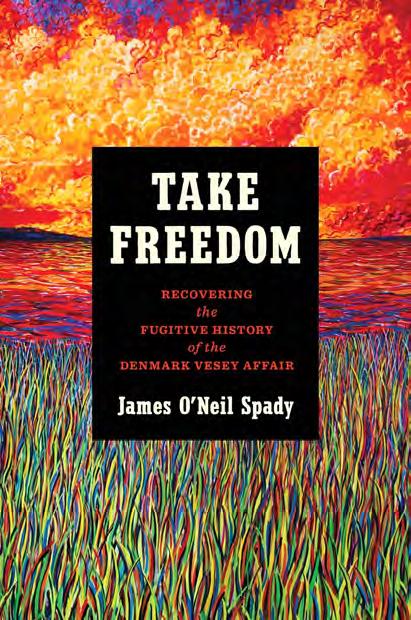
January2026
$29.95 s ISBN: 9781469686370 Paperback
240 pages 11 halftones, 4 maps, 1 tables 9.250 in H | 6.120 in W | 1.000 inT
Social Science / Ethnic Studies
TheJohnHopeFranklinSeries in AfricanAmericanHistoryand Culture
James O’Neil Spady is associate professor of American history at Soka University.
“TakeFreedomapproaches a well-known episode in African American history and brings to bear both new evidence and a radically changed approach. This is a smart, thoroughly researched book that helps us rethink this iconic moment in collective resistance to slavery.”
—Bruce Baker, Newcastle University
Justin Randolph
In the segregated American South, policing was war. Ungovernable police discretion came to the backroads and cattle pastures of America’s rural countryside as ideas of race, property, and belonging reshaped state power.In MississippiLaw, Justin Randolph explores policing’s hinterland to explain US racial authoritarianism between the Civil War and the civil rights movement. In Jim Crow Mississippi, the force behind the police officer’s autocracy carried legacies of empire and slavery into the age of agribusiness and automobiles— from state troops and slave patrols to state troopers and highway patrols. But this was no isolated story of individual barbarism. US military and reform traditions informed ruling-class beliefs in thoughtful police improvement, through both the state militia and its inheritor, the state police.
Black Mississippians fought to raise awareness for and defend their loved ones against the violence spawned by paramilitary police reform. Some took up arms against police officers; some imagined a legal off-ramp to remake public safety after Jim Crow. Ultimately,the Americanization of what one activist called “Mississippi Law” came with more funding and more authority for policing, a key piece of infrastructure for the age of mass incarceration that followed the civil rights revolution. Recounting the work of famous and forgotten activists, MississippiLawis a genealogy of Jim Crow rule and dreams of a safety that might have been and might yet be.
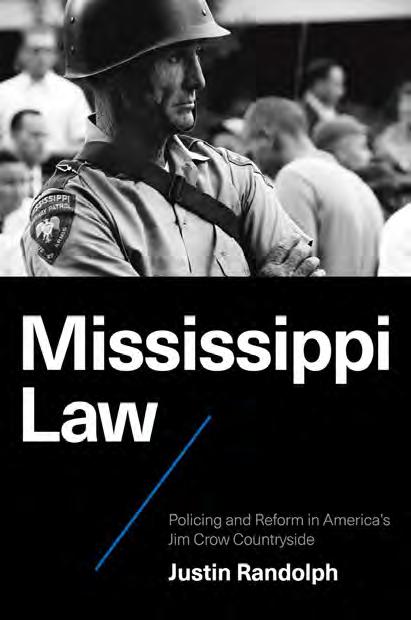
October 2025
$32.95 s ISBN: 9781469689487
Paperback
304 pages 15 halftones, 1 map, bibl.
9.250 in H | 6.120 in W | 1.000 inT
Social Science / Ethnic Studies
Justice,Power,andPolitics
“Randolph has written a landmark history of Jim Crow policing and the Black freedom struggle in Mississippi. In the process, he has contributed an invaluable study of race and rural law enforcement to the field of carceral studies.”
—Jason Morgan Ward, author ofHangingBridge:RacialViolenceandAmerica’sCivilRightsCentury
“Randolph convincingly charts how local rivalries for power among white sheriffs, private citizens, police and patrolmen in Mississippi gave way to alliances against Black political, social, and economic power during the high civilrightsera. MississippiLawis an impressive work of scholarship.”
—Jane Dailey, author ofWhiteFright:TheSexualPanicattheHeartofAmerica’sRacistHistory.
Rosemary Ndubuizu
Thefightagainstlow-wageBlackwomen'shousingprecarity
Amid a national housing affordability crisis with political and social implications, Washington, DC is notorious for its rapidly rising income inequality, high rates of displacement, and some of the most expensive rents in the country. Housing policy expert Rosemary Ndubuizu uncovers more than 100 years of affordable housing politics in the nation’s capital to illustrate local and national trends in how various social, economic, and political forces have worked together to ensure the persistent vulnerability of low-wage Black families to housing insecurity and displacement.
Since the 1960s, Black women have been at the forefront of combating efforts to force them out of DC. The Undesirable Manyrecounts the history of Black women’s tenant activism and organized opposition through a Black feminist materialism framework that exposes present-day housing inequities as deeply entangled in the politics and practices of gender and racial inequity. Drawing upon extensive archival research and dozens of in-depth interviews with Black women tenant activists and affordable housing advocates, Ndubuizu uncovers how gendered stereotypes of Black tenant irresponsibility have shaped market behavior and informed political justification for different consumer treatment. Politicians, landlords, and even nonprofit housing providers often championed disciplinary housing governance such as mandatory housekeeping classes, welfare garnishment, paternal property management, and case management, contending that the problem was not housing but the Black family itself. By exposing these strategies alongside low-income Black women’s political perspectives and experiences, The Undesirable Many offers valuable

November 2025
$29.95 s ISBN: 9781469689685
Paperback
296 pages
14 halftones, 1 map, 1 graph, 1 table
9.250 in H | 6.120 in W | 1.000 inT
Social Science / Ethnic Studies
Justice,Power,andPolitics
Rosemary Ndubuizu is assistant professor of African American studies at Georgetown University.
“A bold and novel intervention. Rosemary Ndubuizu historicizes the phenomenon of inbuilt obstacles that low-wage Black women have faced when seeking safe public housing and fills a dearth of scholarship on the political attacks on public housing in the post–civil rights period.”
—Keeanga-Yamahtta Taylor, author ofRaceforProfit:HowBanksandtheRealEstateIndustryUnderminedBlack Homeownership
“A deep and consequential story of how DC officials and landlords employed cultural stereotypes to justify a regime that tied poor Black families' access to good housing to their willingness to endure state surveillance.”
GeorgeDerekMusgrove,coauthorofChocolateCity:AHistoryofRaceandDemocracyintheNation’sCapital
Julie Berebitsky
A new edition of a vital work on sex, gender, and power in the workplace illuminates pressing issues of our time: #MeToo, COVID-19
This transformative book examines men’s and women’s changing attitudes toward sex and gender in the US workplace. Between 1870 and 1970, white-collar office work became the leading form of employment for American women. As more and more women took office jobs, men and women workers attempted to make sense of this new environment where the workplace became a site of gendered power negotiations: Emotional and sexual desires entangled with “rational” operating procedures.
Drawing on a wide range of primary sources including government investigation reports, scandal papers, memoirs, and advice literature, Julie Berebitsky describes how women perceived and responded to male desire and discrimination in the office. She also offers keen insight into how popular media—cartoons, advertisements, and a wide array of fictional accounts—represented wanted and unwelcome romantic and sexual advances in the workplace.
Now in paperback for the first time, this compelling edition includes a foreword that brings Berebitsky’s work into the present, where the Trump presidencies, #MeToo movement, and global pandemic provide striking illustrations of the book’s enduring relevance. An afterword reflects on Berebitsky’s lasting impact as a feminist, teacher, and scholar in the fields of labor history and women’s studies.
Julie Berebitsky (1962–2023) was professor of history and founding director of the women’s and gender studies program at Sewanee: The Universityofthe South.
Katherine Turk is professor of history at the University of North Carolina at Chapel Hill.
Katherine Parkin is professor of history and the Jules Plangere, Jr. Endowed Chair in American Social History at Monmouth University.

September 2025
$34.95 s ISBN: 9781469691411
Paperback
392 pages 20 halftones, notes, index 9.120 in H | 6.120 in W | 1.000 inT
History / United States
“Sincetherise(andfall)of#MeToo,IoftenhavereturnedtoSexandtheOffice. Julie Berebitsky’s book remains essential reading for a historical perspective on sexual harassment.”
—Eileen Boris, University of California, Santa Barbara
Michael E. Neagle
Exploring the war on terror before 9/11
While the war on terror has been America’s largest and most publicized attempt to root out foreign enemies this century, the quest to identify and destroy real or imagined threats to national security has long been a part of US history. Indeed, since the onset of the United States' overseas empire at the dawn of the twentieth century, it has pursued enemies in places of strategic interest around the globe: the remote islands of the Philippines, the US southern border, hemispheric hot spots in Central and South America, and the greater MiddleEast.
The common depiction of these kinds of foes—private actors who did not formally represent the countries they fought for—has maintained a remarkable consistency over time. The only difference is that enemies who used to be called “bandits” then are now more often referred to as “terrorists.” Connoting an illegitimacy of both cause and means, the widespread use of such terms also has served to blunt deeper considerations of US foreign engagements. Drawing on six case studies, Michael E. Neagle spotlights the commonalities of how the United States has leveraged popular understandings of “bandits” to justify incursions abroad as well as rally popular and political support at home.
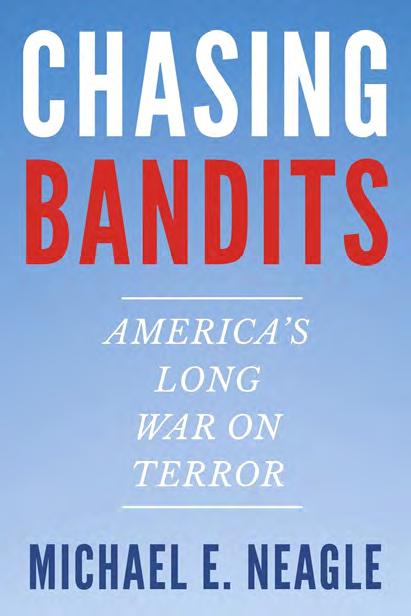
October 2025
$29.95 s
ISBN: 9781469691046 Paperback
224 pages 12 halftones, 6 maps, notes, bibl., index 9.250 in H | 6.120 in W | 1.000 inT
History / United States
“Neagle’s book offers much-needed context for the war on terror, particularly by linking American ideas about irregular warfare to US interventions in Latin America. A must-read for students of terrorism, US–Latin American relations, and US military history.”
—Joseph Stieb, University of North Carolina at Chapel Hill
Amanda Laury Kleintop
ThecomplexhistoryofUSdebatesaboutcompensatingenslavers
During the Civil War, the US government abolished slavery without reimbursing enslavers, diminishing the white South’s wealth by nearly 50 percent. After the Confederacy’s defeat, white Southerners demanded federal compensation for the financial value of formerly enslaved people and fought for other policies that would recognize abolition’s costs during Reconstruction. As Amanda Laury Kleintop shows, their persistence eventuallyledtothecreationofSection4of theFourteenthAmendment, which abolished the right to profit from property in people. Surprisingly, former Confederates responded by using Lost Cause history-making to obscure the fact that they had demanded financial redress in the first place. The largely successful efforts of white southerners to erase this history continues to generate false understandings today.
Kleintop draws from an impressive array of archival sources to uncover this lost history. In doing so, she demonstrates how this legal battle also undermined efforts by formerly enslaved people to receive reparations for themselves and their descendants—a debate that persists in today’s national dialogue.
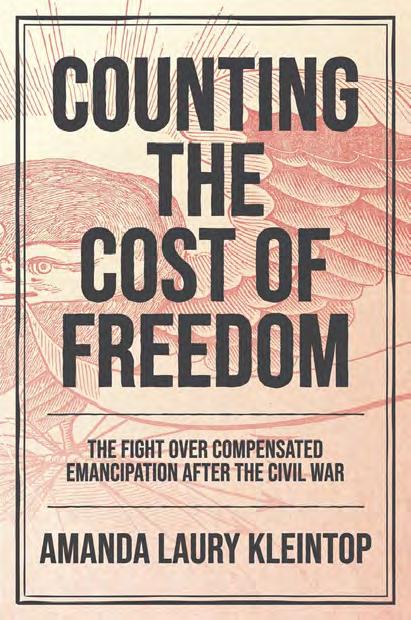
$29.95 s ISBN: 9781469688657
Paperback
280 pages
8 halftones, 1 table, notes, index 9.250 in H | 6.120 in W | 1.000 inT
History / United States
Civil War America
Amanda Laury Kleintop is assistant professor of history at Elon University.
“Amanda Kleintop’s compelling and well-argued book tells us an important but largely forgotten story about the decision to forbid compensation for emancipation in the aftermath of the Civil War. Kleintop’s work reveals truths long buried about how contested and contingent uncompensated emancipation really was.”
—Cynthia Nicoletti, UniversityofVirginia
“Kleintop gives her readers a rich, deeply researched account of how slavery really came to an end in the United States. A compelling story that explains how Americans constructed a postwar world that owed the enslaved nothing.”
—JoannaCohen,QueenMaryUniversityofLondon
Jonathan S. Jones
UncoveringtheforgottenhistoryofCivilWarveteransfacing addiction
During the Civil War, the utility and widespread availability of opium and morphine made opiates essential to wartime medicine. After the war ended, thousands of ailing soldiers became addicted, or “enslaved,” as nineteenthcentury Americans phrased it. Veterans, their families, and communities struggled to cope with addiction’s health and social consequences. Medical and government authorities compounded veterans' suffering and imbued the epidemic with cultural meaning by branding addiction as a matter of moral weakness, unmanliness, or mental infirmity. Framing addiction as “opium slavery” limited the efficacy of care and left many veterans to suffer needlessly for decades after the war ended.
Drawing from veterans' firsthand accounts as well as mental asylum and hospital records, government and medical reports, newspaper coverage of addiction, and advertisements, Jonathan S. Jones unearths the poorly understood stories of opiate-addicted Civil War veterans in unflinching detail, illuminating the war’s traumatic legacies. In doing so, Jones provides critical historical context for the modern opioid crisis, which bears tragic resemblance to that of the post–Civil War era.

October 2025
$39.95 s
ISBN: 9781469689531
Paperback
416 pages
15 halftones, notes, bibl., index
9.250 in H | 6.120 in W | 1.000 inT
History / United States
Civil War America
“Driven by the gripping stories of opiate-addicted Civil War veterans,OpiumSlaveryis a compelling read as well as a rich and textured analysis of an important topic that has—somehow!—not received the attention it deserves. The result is a sensitive exploration of how war, trauma, and social prejudices affected a generation of people who useddrugs.”
—DavidHerzberg,UniversityofBuffalo
Lauren Duval
TheAmericanRevolutiontoldfrominsidethehome
Prior to the American Revolution, the urban centers of colonial North America hadlittledirectexperienceofwar.Withtheoutbreakofviolence, Britishforces occupiedeverymajorcity,invading themostprivateof spaces: the home. By closely considering the dynamics of the household—how people moved within it, thought about it, and wielded poweroverit
TheHomeFrontreveals the ways in which occupation fundamentally upended the structures of colonial society and created opportunities for unprecedented economic and social mobility. In occupied cities, British officers usurped male authority to quarter themselves with families, patriot wives governed households in their husbands' absence, daughters flirted with officers, domestic servants disappeared with soldiers, and enslaved kin absconded to British lines in pursuit of freedom. As Lauren Duval shows, the unique conditions of occupation produced an aggrieved American population bound by shared emotional distress and domestic disorder. In the wake of this deeply disorienting experience, elite Americans deliberately reconsecrated the private home as a national symbol that epitomized masculine authority.
Building on a stunning wealth of primary sources, Duval vividly captures daily life during the Revolution through the eyes and ears of those who intimately experienced it, showing how men and women of all races, statuses, and states of freedom understood its implications for their lives, families, and the nascent American Republic.

December2025
$45.00 s
ISBN: 9781469690056 Hardcover
408 pages
32 halftones, notes, bibl., index 9.250 in H | 6.120 in W | 1.000 inT
History / United States
Published by the Omohundro Institute of Early American History and Culture and the University of North Carolina Press

“This fascinating book uses the prism of the household to plunge readers into the violence and uncertainty of the Revolutionary War. Duval’s deep research and nuanced analysis uncovers how cities occupied by the British Army presented both very real dangers and glimpses of opportunity for women in particular—whether elite or common, free or enslaved— on the Revolutionary home front.”
—Ellen Hartigan O’Connor, University of California, Davis
Republican Crises and Civil Wars in the United States and Mexico, 1848–1867
Erika Pani
Asweepingstoryofcivilwars,politicalcrises,andthedeep connectionsbetweentheconflictsthatremadeMexicoandtheUnited States in the mid-19th century
In1848,theTreaty ofGuadalupeHidalgoendedtheMexican-American War and dramatically reshaped North American geopolitics by ceding half of Mexico’s territoryto the United States. In the followingdecades, as conflictsoverslaveryin theUnitedStatesandoverthenatureofnation, state, and religion in Mexico overwhelmed politics, both republics collapsed into civil war. In Mexico, internal conflict sparked foreign intervention and the establishment of monarchical rule under an Austrian prince, while across the border, eleven Southern states seceded from the union to establish a republic founded on slavery and white supremacy.
Erika Pani’sTornAsunderweaves these two tales of crisis, war, and political experimentation into a single story. Pani argues that by consecrating these episodes as epic and exceptionalist chapters in both nations' histories, scholars have overlooked the coincidences and connections between the United States and Mexico. She chronicles the ways in which, between 1848 and 1867, politicians from the two nations tested different formulas, reacted to virulent opposition, sedition, and war, and ultimately attempted to unite deeply divided countries.TornAsunder highlights the fragile, contentious, and unpredictable nature of politics in the Americas, rooted in the inherent instability of popular sovereignty.

September 2025
$32.95
ISBN: 9781469689081
Paperback
368 pages
13 halftones, notes, bibl., index 9.250 in H | 6.120 in W | 1.000 inT
History / United States
TheDavidJ.WeberSeriesinthe New BorderlandsHistory
Erika Pani is research professor at Centro de Estudios Históricos, El Colegiode México.
“TornAsunderis the most compelling, subtle, and convincing history of the two nineteenth-century North American republics ever written in English.”
—Gregory Downs, University of California, Davis
“A paradigm-shifting interpretation of how crisis tore apart Mexico and the United States at the same time, TornAsunderis atrulysignificantcontributiontothefield.”
—WillFowler,UniversityofSt.Andrews
Fernando Armstrong-Fumero
Amultigenerationalaccountofinfrastructureandpoliticsinrural Yucatán
In 2022, journalists announced the impending economic death of a small Mexicantown.Pisté,gatewaytothefamedChichénItzáarcheologicalsite, would be circumvented by the Tren Maya commuter rail megaproject, depriving it of the promise of steady tourist traffic. Instead of ruminating with frustration, locals set to work on negotiations with the state and federal governments. Generations of experience taught them that pragmatic engagement with mainstream political parties was essential in turning into opportunity projects with the potential to kill the local economy.
Fernando Armstrong-Fumero situates the Tren Maya in a long history of roadbuilding and economic development on the Yucatán Peninsula beginning in the 1930s. Drawing together archival research and decades of ethnographic work, Armstrong-Fumero develops the concept of negative infrastructure to show how infrastructural and industrial investments configure rural economic futures as well as how communities seek to mitigate the harms from projects designed to benefit other regions or interests. The push and pull of development reveals the strategies residents use to influence political change through municipal elections and informal protest. Recognizing their lifechanging potential, rural Maya Yucatecans recast infrastructural projects as new possibilities for inclusion, agency, and resistance as participants in formal state and economic structures.
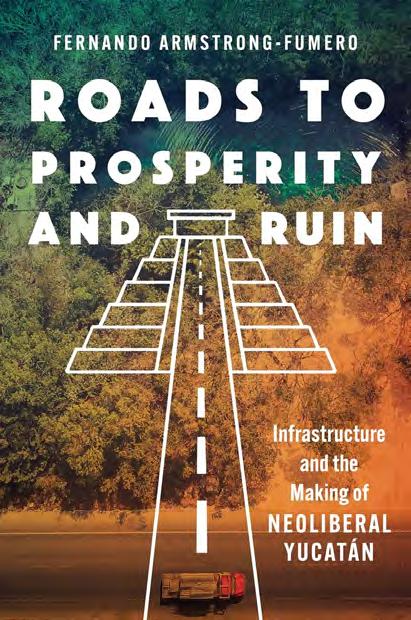
October 2025
$29.95 s
ISBN: 9781469691213
Paperback
240 pages
3 figs., 4 maps, notes, bibl., index
9.250 in H | 6.120 in W | 1.000 inT
Social Science / Anthropology
Fernando Armstrong-Fumero is associate professor of anthropology at Smith College.
“Armstrong-Fumero’s ambitious work brings fresh insight to the theorization around roadbuilding in Mexico, allowing for a more nuanced appreciation of infrastructure.”
—Michael K. Bess, Centro de Investigación y Docencia
Económicas, Mexico
How Medicine Won the Vicksburg Campaign and Changed the Civil War
Lindsay Rae Smith Privette
HowmedicalinnovationsupportedapivotalUnionvictory
Between May 1 and May 22, 1863, Union soldiers marched nearly 200 miles through the hot, humid countryside to assault and capture the fortified city of Vicksburg, Mississippi. Upon its arrival, the army laid siege to the city for a grueling forty-seven days. Disease and combat casualties threatened to undermine the army’s fighting strength, leaving medical officers to grapple with the battlefield conditions necessary to sustain soldiers' bodies. Medical innovations were vital to the Union victory. When Vicksburg fell on July 4, triumph would have been fleeting if not for the US Army Medical Department and its personnel.
By centering soldiers' health and medical care in the Union army’s fight to take Vicksburg, Lindsay Rae Smith Privette offers a fresh perspective on the environmental threats, logistical challenges, and interpersonal conflicts that shaped the campaign and siege. In doing so, Privette shines new light on the development of the army’s medical systems as officers learned to adapt to their circumstances and prove themselves responsible stewards of soldiers' bodies.
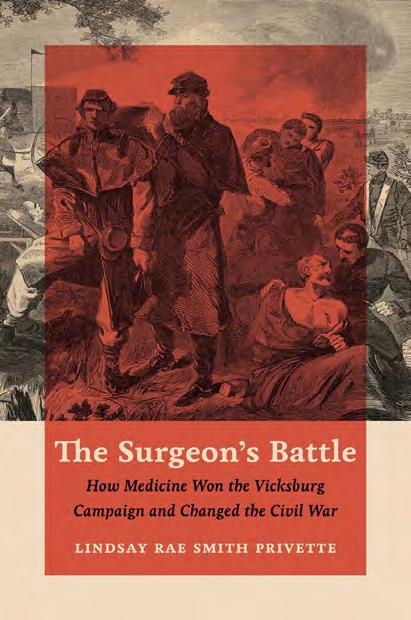
September 2025
$29.95 s ISBN: 9781469690278
Paperback
232 pages 9 halftones, 1 map, 4 tables, notes, bibl., index 9.250 in H | 6.120 in W | 1.000 inT
History / United States
Civil War America
Lindsay Rae Smith Privette is associate professor of history at Anderson University.
“This is the best account of the Vicksburg Campaign that I have read. Privette provides a much-needed reinterpretationofthiscriticalCivilWarbattle.”
—Timothy
Silver,authorofDeathinBriarBottom
Aaron Sheehan-Dean
CivilWarAmericansandthepowerofhistoricalthinking
Civil War Americans, like people today, used the past to understand and traverse their turbulent present. As Aaron Sheehan-Dean reveals in this fascinating work of comparative intellectual history, nineteenth-century Americans were especially conversant with narratives of the English Civil Wars of the 1600s. Northerners and Southerners alike drew from histories of the English past to make sense of their own conflict, interpreting the events of the past in drastically different ways. Confederates, for example, likened themselves to England’s Royalists (also known as Cavaliers), hoping to preserve a social order built on hierarchy and claiming the right to resist what they perceived as radicals' assaults on tradition. Meanwhile, conservative Northerners painted President Lincoln as a tyrant in the mold of English Lord Protector Oliver Cromwell, while radical abolitionists drew inspiration from Cromwell and sought to rebuild the South as Cromwell had attempted with Ireland.
Surveyingtwo centuries of history-making and everyday engagement with historical thought, Sheehan-Dean convincingly argues that history itself wasa battlefront of the American Civil War, with narratives ofthepast exercising surprising agency in interpretations of the nineteenth-century present. SheehanDean’s surprising discoveries provide an entirely fresh perspective on the role of historical memory in the Civil War era and offer a broader meditation on the construction and uses of history itself.
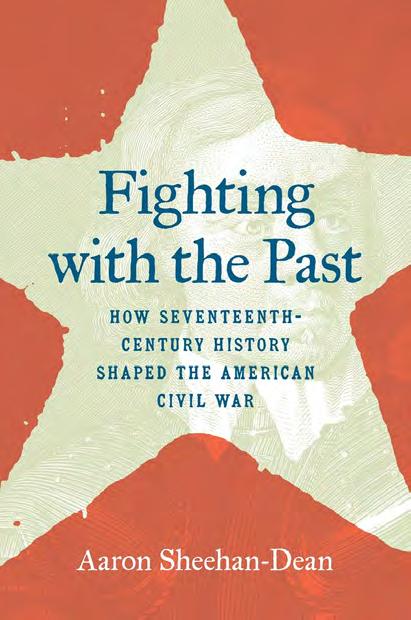
September 2025
$27.95 s
ISBN: 9781469690759
Paperback
224 pages
2 halftones, notes, bibl., index
9.250 in H | 6.120 in W | 1.000 inT
History / United States
The Steven and Janice Brose Lectures in the Civil War Era
Aaron Sheehan-Dean is Fred C. Frey Professor of Southern Studies at Louisiana State University.
“A thoughtful reflection on the assumptions made by Civil War–era Americans, this book demonstrates that this great crisis of the nineteenth century was centered on the US battle over slavery, yes, but it was also a conflict over themeaningsof historyitself.”
—AdamI.P.Smith,UniversityofOxford
“I know of no book quite like this one. Creatively conceived and well-written,FightingwiththePastuncovers an entirely new dimension to understanding the Civil War. Sheehan-Dean’s analysis of an underexplored aspect of the Civil War will challenge historians to think about our subjects not only as historical agents but as historians themselves.”
—Brian Schoen, Ohio University
Sarah Jones Weicksel
ArichlywovenhistoryofCivilWarclothinganditsmanymeanings
During the American Civil War, clothing became central to the ways people waged war and experienced its cost. Through the clothes they made, wore, mended, lost, and stole, Americans expressed their allegiances, showed their love, confronted their social and economic challenges, subverted expectations, and,ultimately,preservedtheirhistory.Ascollectionsleft behind make clear, Civil War Americans believed clothing was not merely a reflection of one’s class, gender, race, military rank, political ideology, or taste. Instead, from the weave of a fabric to the style and make of acoat, Northerners and Southerners alike understood that clothing had the power to affect people’s way of living through the war’s tumult.
In this compelling and well-illustrated history, Sarah Jones Weicksel reveals as never before the meanings of clothing to Civil War Americans. Contributing to the growing body of scholarship on the material culture of the Civil War, Weicksel invites readers to understand the depth of how war penetrated daily life by focusing on the intimate, visceral, material experiences that shaped how people moved through the world.

$37.95 s ISBN: 9781469689142
Paperback
368 pages
78 halftones, notes, bibl., index
9.250 in H | 6.120 in W | 1.000 inT
History / United States
Civil War America
Sarah Jones Weicksel is executive director of the American Historical Association.
“With fresh ideas, captivating characters, and vivid images, this book is a pleasure to read. Weicksel’s insightful analysis and clear prose puts readers in touch with the Civil War in ways that few books can accomplish.”
—Jason Phillips, West Virginia University
“ANationUnraveledis, quite simply, one of the most compelling histories of the American Civil War around. Sarah Jones Weicksel’s thoughtful analysis is full of surprises and vivid evidence. Readers will be convinced that material culture, textiles in particular, are fundamental to understanding the history of war in early America.”
—Zara Anishanslin, University of Delaware
René Esparza
Shifting the focus of AIDS history away from the coasts to the Twin Cities of Minneapolis and St. Paul, this impressive book uncovers how homonormative political strategies weaponized the AIDS crisis to fuel gentrification. During the height of the epidemic, white gay activists and politicians pursued social acceptance by assimilating to Midwestern cultural values. This approach, René Esparza argues, diluted radical facets of LGBTQ activism, rejected a politics of sexual dissidence, severed ties with communities of color, and ushered in the destruction of vibrant queer spaces.
Drawing from archival research, oral histories, and urban studies from the 1970s through the 1990s, Esparza illustrates how the onset of the AIDS epidemic provided a pretext for furthercriminalization of perceived sexual deviance, targeting sex workers, “promiscuous” gay men, and transgender women. More than the criminalization of people and behaviors, it also saw increased targeting of urban venues such as bathhouses, adult bookstores, and public parks where casual, anonymous encounters occurred. Cleansing the city of land uses that undermined gentrification became a protective measure against the virus, and the most marginalized bore the brunt of the ensuing surveillance and displacement. Esparza contends that, despite purporting seemingly progressive values, LGBTQ Midwestern politics of conformity leveragedthe AIDS crisis to further instigate racial and sexual exclusion and fundamentally alter the urban landscape.
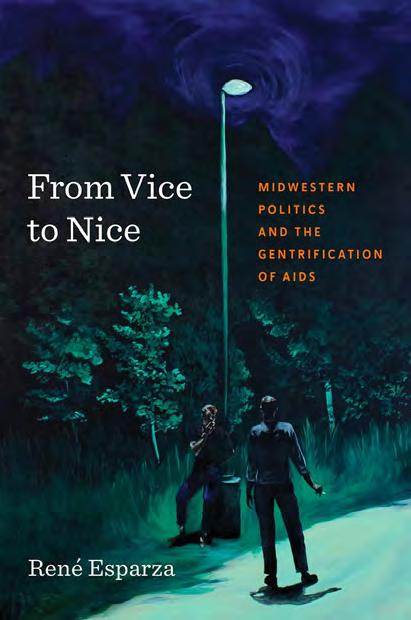
October 2025
$32.95 s ISBN: 9781469690391 Paperback
320 pages
22 halftones, 1 map
9.250 in H | 6.120 in W | 1.000 inT
Social Science / Gender Studies
René Esparza is assistant professor of women, gender, and sexuality studies at Washington University in St. Louis.
“With clear and graceful prose, Esparza delivers a forceful critique of the politics of sexual freedom and bodily autonomy in Minneapolis. A fresh contribution to queer studies and urban history.”
—Jonathan Bell, editor ofBeyondthePoliticsoftheCloset:GayRightsandtheAmericanStatesincethe1970s
“A necessary retelling of the AIDS crisis that illustrates how political leaders and urban developers in 1970s to 1990s Minneapolis criminalized and racialized the sick and the dying for the sake of future profit. A masterful analysis.”
Lisa Marie Cacho, author ofSocialDeath:RacializedRightlessnessandtheCriminalizationoftheUnprotected
Jason Ezell
Southeastsissiesdreamingupradical,magical,nonbinaryworlds
In the Southeastern United States of the late 1970s, a regional network of radical communal gay households formed in the face of rising New Right terror. Comprised of primarily white, self-described sissies, the “Southeast Network,” as it came to be known, spanned from the Ozarks, to New Orleans, to Appalachian Tennessee. Though this network was short-lived, itslegacyliveson todaythroughShortMountainSanctuary,athriving member of the international network of Radical Faeries. Jason Ezell’s intimate account of the formation and dissolution of these sissie houses reveals a little-known history of Southern gay liberation, nonbinary gender expression, and radical feminism and femininity.
Drawing from journals, letters, oral histories, collective manifestos, and newsletters, Ezell illustrates how these gay households nurtured their community through lesbian feminist practices such as collectivism, consciousness-raising, witchcraft rituals, and rural gatherings. As people and practices traveled from one house to another, these linked houses attempted to conjure underground sanctuaries for queer southerners. Preserving their moving stories, Ezell details the visions, experiments, and shortfalls of these radical households in their attempts to build solidarity, resist mounting rightwing violence, and sustain their revolutionary dreams for queer movements yet to come.
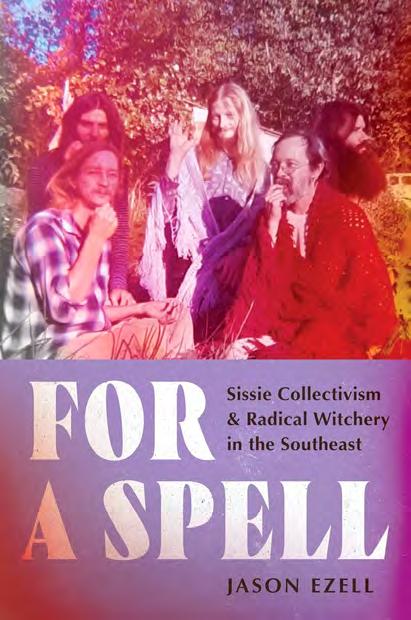
October 2025
$29.95 s ISBN: 9781469690445
Paperback
288 pages
9 halftones, 1 table, notes, bibl., index
9.250 in H | 6.120 in W | 1.000 inT
Social Science / Gender Studies
GenderandAmericanCulture
Jason Ezell is head of learning and engagement at Miami University Libraries.
“A passionate life’s work on queer countercultural organizing, joy, and pain in the US Southeast.”
—La Shonda Mims, author ofDrasticDykesandAccidentalActivists:QueerWomenintheUrbanSouth
“Ezell illuminates hidden histories of queer life and activism in the 1970s US South, challenging readers to re-examine their conceptions of male femininities, queer femme politics, queer religiosity, and the course of the gay liberation movement.”
—G. Samantha Rosenthal, author ofLivingQueerHistory:RemembranceandBelonginginaSouthernCity
The Rise of a Critical Press since the 1980s
Andrew Paxman
Aninsider'saccountoftheriseandfallofMexicanjournalismsince 1980
In the first narrative history in English of Mexico’s contemporary press, Andrew Paxman recounts the evolution of print media between the 1980s and the present. From widespread subservience towards authority to playing a watchdog role as the country democratized, Mexico’s media underwent drastic changes in its roles and functions.
Paxman also traces how the media responded to outright state hostility and major threats to its existence, including a war on drugs that made Mexico the riskiest country for reporters outside a combat zone, a decline in revenue as readers and advertisers migrated to the internet, a partial return to government cooptation. Based on interviews with 180 current and former journalists and extensive research in newspaper libraries, MexicanWatchdogsinterweaves critical analysis with the stories of key reporters, editors, and publishers as well as the trajectories of Mexico’s leading print and on-line media.

October 2025
$34.95 s
ISBN: 9781469684987
Paperback
368 pages
27 halftones, 1 map, notes, bibl., index
9.250 in H | 6.120 in W | 1.000 inT
Andrew Paxman is research professor of history and journalism at the Center for Research and Teaching in Economics (CIDE) in Mexico.
Social Science / Media Studies
“Paxman has gifted us an extraordinarily detailed and impeccably written book on the rise (and fall) of Mexico’s free press. Historians, media scholars, and political scientists will use this book as a bible for years to come.”
Benjamin
T. Smith, author ofTheDope:TheRealHistoryoftheMexicanDrugTrade
Pablo Piccato, Translated by Quentin Pope
Mexicoisnotessentiallyviolent.EachformofMexico'sviolencehasa history
PoliticalrhetoricoftenportraysMexicoasaninherentlyviolentnation. Available now for the first time in English, Pablo Piccato’s essential work cuts through the noise to contextualize violence as a historical phenomenon. Piccato shows us that violence is not unique to Mexico but, just as anywhere else, has erupted there in many forms. Attending to multiple histories of violence, Piccato reveals how violence emerges as a resource that people mobilize to various ends—not an uncontrollable impulse or the simple result of corrupt political power.
Traversingthetwentiethcenturythroughthelensofviolence,Piccato interprets and draws connections between violence arising from revolution, agrarian and religious struggles, guerrilla and counterinsurgency movements, and common crime, all without losing sight of the distinct contexts and social dynamics of each. Gender violence, he argues, surfaces as a common thread, shaping all other forms of violence. Piccato brings to light how guerrillas, the military, politicians, and common criminals rationalized violence to fit their goals, ideologies, and values. In an unflinching analysis that contends that violence is not an essential trait of Mexican society, Piccato presents a new paradigm for understanding violence and illustrates that we are not powerless against it.
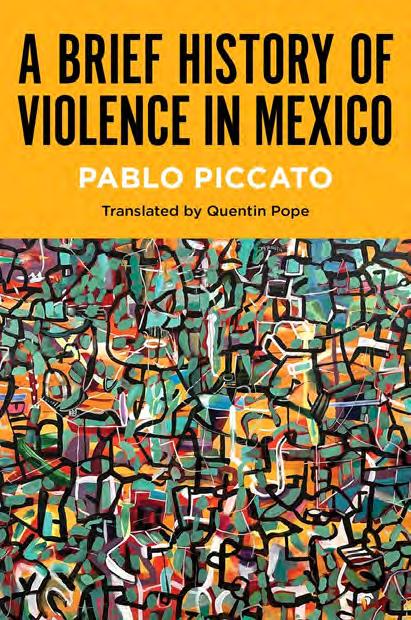
$32.95 s ISBN: 9781469689944 Paperback
240 pages
3 graphs, bibl., index
9.250 in H | 6.120 in W | 1.000 inT
History / Latin America
Pablo Piccato is professor of history at Columbia University and author ofA HistoryofInfamy:Crime,Truth,andJusticeinMexico
Quentin Pope is a UK-based translator who lived in Mexico forovertwenty years.
Latin America in Translation/en Traducción/em Tradução
“A path-breaking book by a leading scholar of Latin American history that challenges long-held stereotypes about Mexican cultureandsociety.”
—FedericoFinchelstein,authorofTheWannabeFascists:AGuidetoUnderstandingtheGreatestThreattoDemocracy
“An accessible overview of what is perhaps thecentralconcerninthestudyofcontemporaryMexico,thistimely book, with its lucid prose and vivid examples, delivers a rare blend of synthesis and subtlety.”
—Thomas Rath, authorofTheDreadPlagueandtheCowKillers:ThePoliticsofAnimalDiseaseinMexicoandtheWorld
Irvin Ibargüen
AgroundbreakingtransnationalstudyofMexico'searlyattemptsto controlout-migration
Migration between the United States and Mexico is often compared to the river that runs along the border: a “flow” of immigrants, a “flood” of documented and undocumented workers, a “dam” that has broken. Scholars, journalists, and novelists often tell this story from a south-to-north perspective, emphasizing Mexican migration to the United States, and the American response to the influx of people crossing its borders.
InCaughtintheCurrent,IrvinIbargüenoffersaMexico-centeredhistoryof migration in the mid-twentieth century. Drawing on Mexican periodicals and archival sources, he explores how the Mexican state sought to manage US -bound migration. Ibargüen examines Mexico’s efforts to blunt migration’s impact on its economy, social order, and reputation, at times even aiming to restrict the flow of migrants. As a transnational history, the book highlights how Mexico’s policies to moderate out-migration were contested by both the United States and migrants themselves, dooming them to fail. Ultimately,CaughtintheCurrent reveals how both countries manipulated the border to impose control over a phenomenon that quickly escaped legal and political boundaries.
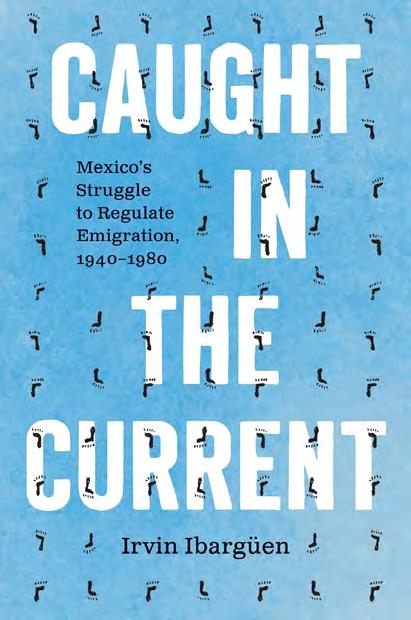
October 2025
$27.95 s
ISBN: 9781469689586
Paperback
256 pages
7 halftones, 2 maps, notes, index 9.250 in H | 6.120 in W | 1.000 inT
History / Latin America
TheDavidJ.WeberSeriesinthe New Borderlands History
Irvin Ibargüen is assistant professor of history at New York University.
“Ibargüen’s richly researched and nuanced interpretation of Mexico’s role in the Bracero Program is a significant addition tothestudyofmigrationandUS-Mexicandiplomaticrelations.”
—SoniaHernández,TexasA&MUniversity
“Through centering Mexico in the story of migration policies,CaughtintheCurrentoffers an original and much-needed perspectiveonthehistoryoftheUS-Mexicoborder.”
—MiguelA.Levario,TexasTechUniversity
Mila Burns
AtrailblazinganalysisofBrazil'sinfluenceonthe1973Chileancoup d'état
This book offers a groundbreaking perspective on the 1973 Chilean coup, highlighting Brazil’s pivotal role in shaping the political landscape of South America during the Cold War. Shifting the focus from the United States to interregional dynamics, Mila Burns argues that Brazil was instrumental in the overthrow of Salvador Allende and the establishment of Augusto Pinochet’s dictatorship.
Drawing on original documents, interviews, and newly accessible archives, particularly from the Brazilian Truth Commission, Burns reveals Brazil’s covert involvement in the coup, providing weapons, intelligence, and even torturers to anti-Allende forces. She also explores the resistance networks formed by Brazilian exiles in Chile. Burns’s impeccable research—combining history, anthropology, and political science—makesDictatorshipacrossBordersa vital addition to Cold War studies, reshaping how we understand power and resistance in South America.

$29.95 s ISBN: 9781469689630
Paperback
256 pages 10 halftones, 1 table, notes, bibl., index 9.250 in H | 6.120 in W | 1.000 inT
Social Science / Ethnic Science
Mila Burns is associate professor of Latin American and Latino Studies at Lehman College, and of History at The CUNY Graduate Center, where she is also the Associate Director at the Center for Latin American, Caribbean, and Latino Studies.
“A most impressive work of empirical scholarship,DictatorshipacrossBordersreveals Cold War Brazil as a kind of imperial viceroy for the United States. Drawing on new oral histories and freshly declassified Latin American archives, the book’s analytic breadth ranges from a Gramscian analysis of the agency of Brazil’s bourgeoisie to a Global South history framework to describe socialist Brazilian exiles forming counterhegemonic solidarities across borders.”
—Thomas C. Field Jr., Embry-Riddle Aeronautical University
Rana Barakat
In Palestine, a walk across the landscape is a journey of return that defies time, layered with sediments of personal experience and collective peoplehood. For Palestinian scholar Rana Barakat, the experience of place is guided by the stories and memories of her grandmother, who was among the 750,000 people forcibly displaced in 1948 by the newly formed Israeli government. Since then, the violence of settler colonialism has actively prevented the return of Palestinian refugees, including those from Lifta, her family’s ancestral village. In the present, the settler state of Israel seems to control the fate of the remaining structures in Lifta, enforcing so-called development plans that limit access and leave the valley appearing frozen in time. By gathering stories from family and community members alongside archival sources and lived experience in the West Bank under Israeli occupation, however, Barakat reveals the way storytelling provides a form of ongoing return to a once-thriving village and to Palestine itself.
One of the first books to position Palestinian studies within Indigenous studies, Barakat offers a rich perspective on Palestinian history and lives today. Embedded in a deeply personal journey,OngoingReturntakes the reader through the past via the present and dares to imagine futures for Palestine and its people.
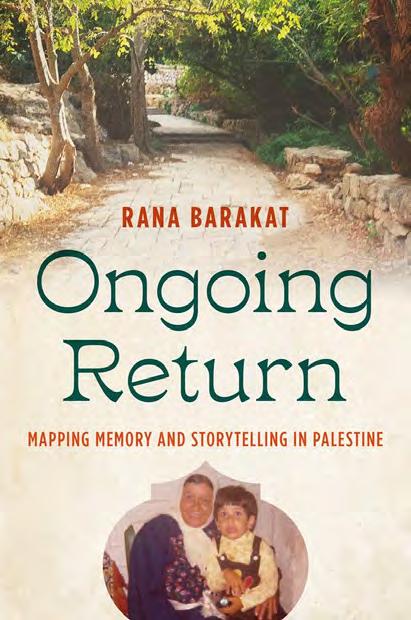
January 2026
$32.95 s
ISBN: 9781469680309
Paperback
224 pages
5 halftones, notes, bibl., index
9.250 in H | 6.120 in W | 1.000 inT
Social Science / Ethnic Science
CriticalIndigeneities
“Barakat’s exceptionally well-conceived book demands a reorientation of historical narratives regarding Palestine. By centering Palestinian stories and their power to affect forms of return, Barakat shows how Palestinians resist the power of the ongoing Nakba even as they confront ongoing threats to their continuance and peoplehood.”
Robert Warrior, University of Kansas
Brian Harnetty
Howtoplayanarchive
Composer and sound artist Brian Harnetty explores the remarkable everyday stories of sound recordings and shows us a new way to listen to the past. From murder ballads and oral histories in Appalachian Ohio, to the Afrofuturistic music of Sun Ra in Chicago, to the thoughts of monk and writerThomasMerton inKentuckycapturedonaudiotape,Harnettyreveals rich historical contexts of the recordings, and introduces us to people and places connected to them. The result is a new, interdisciplinary approach to sound archives, listening, creative practice, and community engagement.
Drawing upon his two-decade career as an artist and researcher, Harnetty builds upon and expands the tradition of composers and artists writing about their work. A unique combination of ethnography, memoir, philosophical text, and creative process book,NoisyMemorypresents both scholarly and creative approaches to ethically working with sound archives.

August 2025
$27.95 s ISBN: 9781469691343
Paperback
208 pages
25 halftones
9.250 in H | 6.120 in W | 1.000 inT
Music / Ethnomusicology
Brian Harnetty is an interdisciplinary sound artist, composer, and author.
“A beautifully rendered mix of memoir, creative practice, deep listening, and social history,NoisyMemoryinsists that cultural studies can be both scholarly and personal, artful and ethical. Brian Harnetty reminds us that archival study is never neutral, but always situated—materially, socially, and historically, but also politically—in community. This book is a model for community-engaged humanistic scholarship.”
—Ryan Thomas Skinner, author of Afro-Sweden:BecomingBlackinaColor-BlindCountry
Julie L. Reed
Historians largely understand Native American education through the Indian boarding schools and reservation schools established by the US government during the nineteenth and twentieth centuries. But Native Americans taught and learned from one another long before colonization, and while white settlers and institutions powerfully influenced Indigenous educational practices, they never stopped Native people from educating one another on their own terms.
In this ambitious and imaginatively conceived book, Julie L. Reed uses Cherokee teaching and learning practices spanning more than four centuries to reframe the way we think about Native American educational history. Reed draws on archaeological evidence from Southeastern US caves, ethnohistorical narratives of Cherokee syllabary development, records from Christian mission schools, Cherokee Nation archives, and family and personal histories to reveal surprising continuity amid powerful change. Centering the role of women as educators across generations in Cherokee matrilineal society, the power of land to anchor learning, and the significance of language in expressing sovereignty, Reed fundamentally rethinks the nature of educational space, the roles played by teachers and learners, and the periodization imposed by US settler colonialism onto the Indigenous experience.

January 2026
$32.95 s
ISBN: 9781469684901
Paperback
272 pages
7 drawings, 13 halftones, 1 maps, notes, bibl., index
9.250 in H | 6.120 in W | 1.000 inT
Social Science / Ethnic Studies
Julie L. Reed is associate professor of history at Pennsylvania State University.
“This is a great read and a wonderful contribution to the history of Native American education. With her creative and fresh methodology, Reed beautifully articulates the materiality, theory, and practices of Cherokee schooling.”
—K. Tsianina Lomawaima, coauthor of“ToRemainanIndian:"LessonsinDemocracyfromaCenturyofNativeAmerican Education
Craig Thurtell
Thepromiseofhopeandtheagonyofdespair
Chronicling the rise and fall of North Carolina’s fusion movement, this book illuminates an intricate interplay between politics, economic agendas, and racism. It examines how wealthy agriculturalists, industrialists, lawyers, merchants, and railroad leaders manipulated the state’s political, economic, and social structures to assert dominance and maintain white supremacy, undermining the power gained by African Americans during Reconstruction. By the mid-1890s, however, Black and white Republicans and supporters of the smaller Peoples' Party formed a coalition known as fusion, upending two decades of the Democratic Party’s white elite political domination in North Carolina. After four years, the Democratic Party mobilized under the menacing banner of white supremacy and, led by conservative, pro-business white people, restored theparty’scontroloverthestategovernment.
Craig Thurtell contends that an examination of this period reveals that race was not the sole factor in the Democratic Party’s quest for control. Instead, elite white men sought to establish a new social order influenced by class divisions, and Short of a Revolution provides a comprehensive analysis of these dynamics, revealing the multifaceted motivations behind the political shifts of late nineteenth-century North Carolina.

January 2026
$37.95 s
ISBN: 9781469689838
Paperback
336 pages
2 maps, 4 graphs, notes, bibl., index 9.250 in H | 6.120 in W | 1.000 inT
History / United States
Craig Thurtell is an independent scholar.
“With detailed new research and a fresh interpretation of the economic and racial forces in 1890s North Carolina, Shortof aRevolutionsheds invaluable light on the violent clashes that finally crushed the Reconstruction experiment and launched the Jim Crow South.”
—Harry Watson, University of North Carolina at Chapel Hill
Adrienne Krone
Religiousmotivationsforremakingfoodsystems
Ethical and moral concerns about food and diet commonly feature in individuals' religious identities and expressions. These concerns extend beyond what one should eat to include how food should be prepared and produced. As Adrienne Krone demonstrates in this ethnographic study, participants in alternative food movements are developing new ways to see food preparation and production as religious acts. Following two Christian and two Jewish food organizations, Krone complicates our understanding of American religion as religious people come together across a range of differences to change the food system.
Free-Range Religion showcases the complex ways that religion lives and works within food production, marketing, and distribution. These “free-range” religious practices blend belief and practice with secular concerns and constitute a key, albeit understudied, part of the American alternative food movement.
Adrienne Krone is associate professor of environmental science and sustainability and religious studies at Allegheny College.

November 2025
$27.95 s
ISBN: 9781469690322
Paperback
224 pages
13 halftones
9.250 in H | 6.120 in W | 1.000 inT
Religion / General
WhereReligionLives
“Krone’s unique ethnographic narrative gives readers valuable insight into the contemporary conversation between religious and alternative food movements. She uncovers tensions and complications for those seeking to draw together food justice and religion, but she also reveals how notions of the sacred emerge in relation to land, food, andthehuman body.”
—GretelA.VanWieren,MichiganStateUniversity
Nathan L. M. Tabor
Chroniclingtheoriginsofaglobalpoetryphenomenon
For centuries, Urdu-speaking poets and their audiences have gathered for mushāʿirahs, literary competitions for spoken-word verse. Today the mushāʿirah is a global phenomenon, as audiences in the millions convene in person and online for hours of poetic performance. Tracing these modern gatherings back to their origins, Nathan L. M. Tabor introduces readers to the popular emergence of the mushāʿirah in eighteenth-century Delhi. Scores of poets composed two-line lyric poems, called ġhazals, that they muttered, sang, shouted, and spat out in contentious salon spaces across India's largest metropolis. Delhi's mushāʿirahs circulated lyrics, satires, and songs for both common and elite poets, who traded and assessed words like an urban commodity that defined hierarchy, taste, and notions of delight.
Via poets' verse exchanges and the histories they wrote about Dehli's literary scene, City of Lyrics reconstructs the social networks the mushāʿirahs produced. By understanding the roots of this uniquely Islamic literary practice, readers will also gain insight into global popular culture today, which increasingly takes shape according to tastes and values from the Muslim world yet is enjoyed by wide audiences comprised of both Muslims and non-Muslims alike.

October 2025
$39.95 s ISBN: 9781469690223
Paperback 336 pages 4 halftones, 1 map, 2 tables, notes, bibl., index 9.250 in H | 6.120 in W | 1.000 inT
Religion / Islam
IslamicCivilizationand Muslim Networks
“This lively book captures the emotional vigor of Urdu poetry and offers a very persuasive argument about the breadth of literary networks across the Persianate world.”
—Purnima Dhavan, University of Washington
Alaina M. Morgan
IlluminatingIslam'sroleinglobalBlackfreedomstruggles
In the period between the twentieth century’s two world wars, Black and Muslim people from the United States, South Asia, and the Caribbean collided across an expansive diasporic geography. As these people and their ideas came into contact, they reignited the practice of Islam among people of African descent living in the United States and the Anglophone Caribbean and prompted them to adopt new understandings of their place in the world. As the freedom dreams of these diasporic communities met the realities and limitations of colonialism and race in the Atlantic world, Islam presented new strategies for combatting oppression and introduced new allies in the struggle.
Envisioning the geography and significance of this encounter within what she calls the Atlantic Crescent, Alaina M. Morgan draws on an expansive archive to show how Black and Muslim people imagined, understood, and acted on their religious and racial identities. Morgan reveals how her subjects' overlapping diasporic encounters with Islam led to varied local adaptation as well as common ground to pursue liberation from racial subjugation and white supremacy.

July 2025
$29.95 s ISBN: 9781469688718
Paperback
288 pages 20 halftones, notes, bibl., index 9.250 in H | 6.120 in W | 1.000 inT
Religion / Islam
Alaina M. Morgan is assistant professor of history at the University of Southern California.
“Morgan’s suggestive imagery of the Atlantic Crescent and her attention to Black Islamic practices as a conduit of African diasporas makes this book stand out among its peers. Stunningly written and brilliantly argued, Morgan’s book draws on a diverse body of religious work to illuminate an underappreciated element of black internationalist political thought.”
—Minkah Makalani, Johns Hopkins University
“Well written, carefully organized, and deeply researched, this field-shaping book is critical to understanding what has motivated those pursuing transnational work for justice and freedom. Morgan models how to make understudied histories accessible and charts a Muslim Black internationalism, reconfiguring American religious history in the process.”
—Sarah Azaransky, Union Theological Seminary
David F. Evans
HowdidwhiteChristiansfailtheBlackfreedomstruggle?
The memory of the long civil rights movement often celebrates white men and women who drew on their religious faith to support Black demands for racial justice. However, the visions and actions of these leaders and their organizations often conflicted with those of Black leadership. While Black activists fought for a broad vision of freedom, white allies focused more narrowly on cultivating interracial friendship, marching in parallel to Black movement leaders rather than alongside them.
DamnedWhitenessoffers an unflinching history of white-led efforts at interracial organizing gone astray. Considering the examples of Dorothy Day, cofounderoftheCatholicWorkerMovement;ClarenceJordan, spiritual father of Habitat for Humanity; and Ralph Templin, a Christian missionary who studied nonviolence in Gandhi’s India, David F. Evans reveals how religious white progressives inherited strategies that remained disconnected from the ideas and actions of Black communities. These disconnects have often been cloaked as disagreements over religious doctrine and practice, but Evans reveals how they stem from refusals to acknowledge Black leaders' philosophies and freedom dreams. Though these patterns persist, Evans offers a way out of this legacy of white allyship and into a future where freedom is possible.
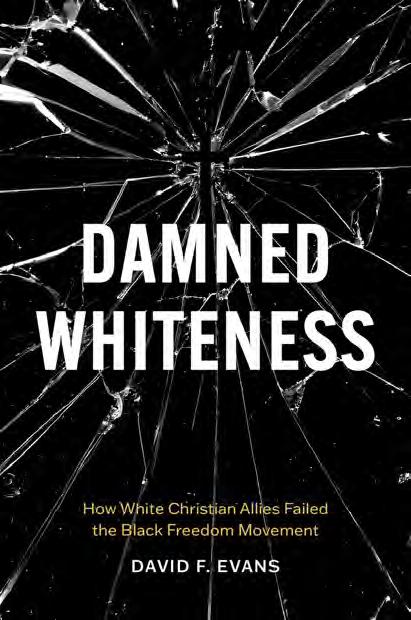
October 2025
$29.95 s ISBN: 9781469691473
Paperback
304 pages notes, bibl., index 9.250 in H | 6.120 in W | 1.000 inT
Religion / Christianity
David F. Evans is professor of history and intercultural studies at Eastern MennoniteSeminary.
“This gem of a book offers impressive historical depth and an important corrective for the many works that either dismiss the role of white Christian allyship in the civil rights movement or overstate its impact.”
—Tobin Miller Shearer,UniversityofMontana
“Evans offers a detailed yet highly accessible history, diving deeply into the relationship between Black civil rights and white allyship. DamnedWhitenessmeets our present political and religious moment and provides a helpful aid for those pursuing antiracism.”
—Reggie
Williams,
St. Louis University
Kylie M. Smith
Untanglingtherelationshipbetweenraceandpsychiatryinthe AmericanSouth
There is a complicated history of racism and psychiatric healthcare in the Deep South states of Georgia, Alabama, and Mississippi. The asylums of the Jim Crow era employed African American men and women; served as places of treatment and care for African Americans with psychiatric illnesses; and, inevitably, were places of social control. Black people who lived and worked in these facilities needed to negotiate complex relationships of racism with their own notions of community, mental health, and healing.
KylieM.Smithmixesexhaustivearchivalresearch,interviews,andpolicy analysis to offer a comprehensive look at how racism affected Black Southerners with mental illness during the Jim Crow era. Complicated legal, political, and medical changes in the late twentieth century turned mental health services into a battlefield between political ideology and psychiatric treatment approaches, with the fallout having long-term consequences for patient outcomes. Smith argues that patterns of racially motivated abuse and neglect of mentally ill African Americans took shape during this era and continue to the present day. As the mentally ill become increasingly incarcerated, reminds readers that, for many Black Southerners, having a mental illness was—and still is—tantamount to committing a crime.
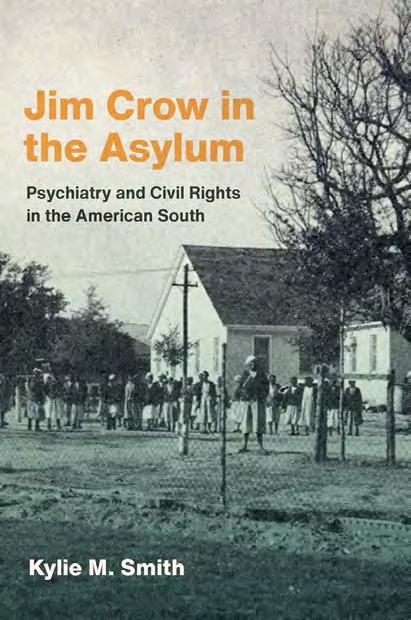
January 2026
$34.95 s ISBN: 9781469689203
Paperback
352 pages 17 halftones, 3 tables
9.250 in H | 6.120 in W | 1.000 inT
Medical / Health Policy
StudiesinSocialMedicine
Kylie M. Smith is associate professor and director of the Center for Healthcare HistoryandPolicyatEmoryUniversity.
“This is the best mixture of careful social history with an intellectual and theoretical approach to the history of racism and psychiatry that I have seen. The book will be a model for every historian—a must-read.”
—Susan M. Reverby,authorofCo-ConspiratorforJustice:TheRevolutionaryLifeofDr.AlanBerkman
Stephen J. Ramos
During the interwar years, the discourse of regional planning profoundly reformulated the spatiality of race and place in the United States. In the South, Jim Crow brutality and agriculture crisis fueled unprecedented population outmigration. Sociologist and author Howard W. Odum founded the Institute for Research in Social Science at the University of North Carolina to develop a Southern regionalism that reasserted organic territorial culture amid that flux. Regionalism connected the arts, humanities, and social sciences across the country in a collective effort to elevate place-based narrative and folk sensibility to an all-encompassing socialtheory.
Stephen J. Ramos refocuses the history of US regionalism and regional planning on the South, illuminating the modern tensions inherent in regionalism as nostalgic cultural practice paired with future-oriented planning ideology. By tracing Southern regionalists' intellectual history and institutional biography, Ramos explores how they developed a regional-nationalism through survey and plan that came to inspire federal New Deal policies for the South. In showing how Odum’s influence crossed regional and national borders, Ramos offers us a nuanced way to reappraise race, social science, and planning in the US South.

2025
$29.95 s ISBN: 9781469690117
Paperback
288 pages
21 halftones, notes, bibl., index
9.250 in H | 6.120 in W | 1.000 inT
Social Science / Ethnic Studies
Stephen J. Ramos is a professor of urbanism at the University of Georgia.
“In this book, Stephen J. Ramos holds Howard Odum and his time at UNC as his lodestar of analysis but smartly connects his argument within the broader national and international canon of those theorizing the region at the turnofthecentury.A much-neededtextthattreadsonnewground.”
—BarbaraBrownWilson,UniversityofVirginia
“An original and deeply researched analysis of the movement known as Southern Regionalism from the 1920s through the 1950s, centering on its best-known figure, Howard W. Odum. Stephen Ramos’s interpretation is fresh and original, his scholarship impressive, and his prose vigorous.”
—Robert Fishman, University of Michigan
This novel is one of the most clear-eyed and compelling works of the Great Depression. As Marge Crenshaw grows up in the cotton mills, she learns to fight the forces of racial, sexual, and class oppression that hold her, her family, and her community back. With her brother Tom, who has joined the Communist Party, Marge eventually becomes a union organizer who leads the famous strike at Loray Mill in Gastonia, North Carolina—a real-life strike in 1929 that claimed numerous lives, including that of organizer and songwriter Ella May Wiggins.
Myra Page was an active member of the Communist Party, andGatheringStorm stands out from other Gastonia novels because it was printed in the Soviet Union. Yet this is not a novel about outsider agitators infiltrating a peaceful Southern town. Page was born in Virginia and worked as a labor organizer throughout the South. And as Marge’s heart-wrenching story demonstrates, the fight against the forces of capitalist exploitation and inequality was entirely homegrown.GatheringStorm is a bona fide Communist novel; but with the story of Marge and her family at its heart, it is also a deeply intimate novel that proves the personal is always political.

September 2025
$29.95 s ISBN: 9781469691091
Paperback
352 pages 10 halftones
8.000 in H | 5.000 in W | 1.000 inT
Fiction / Historical
RadicalSouths
Myra Page (1897–1993) wasatwentieth-centuryAmericanwriter, journalist, and noted Communist.
Michael P. Bibler is associate professor at Louisiana State University.
“GatheringStormis a useful, even powerful place for contemporary readers to reacquaint (or newly acquaint) themselves with what we mean when we refer to the proletariat tradition. Reading the novel against the backdrop of today’s dizzying political confusion, the miasmatic furor of the populist right and the siloed certitudes of the progressive left, I felt a compelling clarity in the openly ideological structures clearly visible and firmly in place behind Page’s fictive prose. I'm delighted it is back in print.”
—Ed Pavlic, author ofCallItintheAir:Poems
Apowerfulnovelinspiredbytrueevents,nowavailableforthefirst timeinageneration
Inspired by the horrors of the Greensboro Massacre, Cris South penned ClenchedFists,BurningCrossesaspartofthenotedFeminarycollective. The book, a thinly fictionalized representation of her own life and activism, centers on Jessie, a working-class printer whose antiracist and anti-Klan activism come to the attention of Klan members, with harrowing results. Jessie’s story mirrors that of the author’s and offers a vision of what multiple intersectional coalitions of oppressed people look like: lesbian feminists, Black activists, and, perhaps most memorably, a woman who confronts her abuser swinging an axe, Lizzie Borden style, to reclaim her agency.
Although Jessie’s suffering—and the suffering of the women around her—is stark in its realism, the book ends with a celebration of both resistance and love. This is the novel’s distinctive contribution: it refuses abjection and claims the healing power of political resistance and coalition.

September 2025
$29.95 s ISBN: 9781469691152
Paperback
256 pages 8.000 in H | 5.000 in W | 1.000 inT
Fiction / Historical
Cris South is a writer, printmaker, and former member of the Feminary collective based in Durham, North Carolina.
Jaime Harker is professor of English and the director of the Sarah Isom Center for Women and Gender Studies at the University of Mississippi.
RadicalSouths
“Cris South draws on firsthand experience inClenchedFists,BurningCrossesto reveal how women’s relationships to one another shaped the unfolding of now-historical events. This intimate vantage on the interaction of women in a particular time and place makes for a compelling novel even apart from its historical interest. However, by gazing on domestic, sexual, and political violence and how they intertwined in a small but consequential community, South connects that community to women everywhere. An important work finally widely available.”
—Tara
Powell,UniversityofSouthCarolina
Brian D. Behnken
This sweeping history tells a story of fits and starts of Mexican Americans' interactions with law enforcement and the criminal justice system in the USSouthwest.LookingatprimarilyArizona,California,NewMexico,and Texas, ittellsacomplexstory:thatviolent,oftenracistactscommittedby police against Mexican American people sparked protests demanding reform, and criminal justice authorities frequently responded positively to these protests with reforms such as recruiting Mexican Americans into local police forces or altering training procedures at police academies.
Brian D. Behnken demonstrates the central role that the struggle for police reform played in the twentieth-century Chicano movement, whose relevance continues today. By linking social activism and law enforcement, Behnken illuminates how the policing issues of today developed and what reform remains to be done.
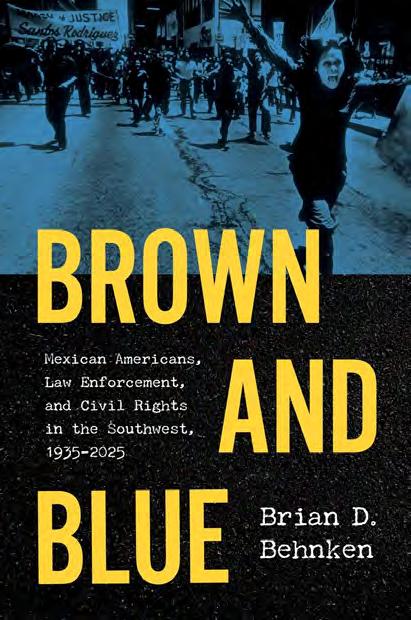
November 2025
$34 95 s
ISBN: 9781469690704
Paperback
336 pages
17 halftones
9 250 in H | 6.120 in W | 1.000 inT
Brian D. Behnken is professor of history at Iowa State University and author of Borders of Violence and Justice: Mexicans, Mexican Americans, and Law Enforcement in the Southwest, 1835–1935.
History / United States
“A vitally needed study of the relationship between law enforcement, violence, and Chicano civil rights activism acrossthe Southwest.”
—MaxFelker-Kantor,authorofDAREtoSayNo:PolicingandtheWaronDrugsinSchools
“AtourdeforceaccountofpolicebrutalityagainstMexicanandMexicanAmericanpeopleintheUSSouthwest. This important book places police brutality against Mexican and Mexican American people at thevery centerof carceral histories.”
—Robert T. Chase, author ofWeAreNotSlaves:StateViolence,CoercedLabor,andPrisoners’RightsinPostwarAmerica
Jennifer Banning Tomás
reclaimingtheirnarrative
Women’s history traveled a long and fascinating path before it became a respected and recognized academic field in twentieth-century America. This book explores the field’s development as a multiracial and multigenerational effort, going beyond the careers of individual women historians to focus on how the discipline itself took shape. Focusing on the crucial period between 1900 and 1968, Jennifer Banning Tomás shines a light on the work performed by archivists and professional historians that gave women’s history its own identity and legitimacy.
The women inReclaimingCliolaid the groundwork for the field’s remarkable expansion during the final wave of twentieth-century feminism after 1970, when a genuine movement for women’s history emerged. Their contributions made the later success of women’s history possible. Tomás reveals the dedication and vision that turned women’s history into the thriving,influentialfielditistoday.
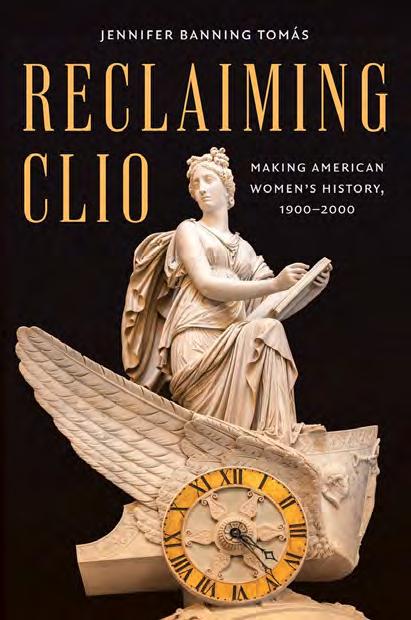
December2025
$44.95
ISBN: 9781469686011
Paperback
496 pages 20 halftones, 4 tables, notes, bibl., index 9.250 in H | 6.120 in W | 1.000 inT
Social Science / Women's Studies
“In a moment of increasingly virulent culture wars,ReclaimingClioprovides the grounding to remember how histories are made and how movements persist in the face of opposition.”
—Catherine O. Jacquet, Louisiana State University
LindaM.Mayhew
In 1877, the atmosphere in Russia was highly contentious. Amid war with the Ottoman Empire, the nation was also grappling with intense intellectual and political conflicts. Various groups and individuals were fervently engaged in shaping the country’s future, navigating a landscape marked by strict censorship and deep ideological divides. This game, set in St. Petersburg, immerses students into the vibrant and combative world of Russian literary journals. Students assume the roles of editors, writers, and social activists navigating the complex intersection of literature and politics. The periodicals they produce are filled with subtle political commentaries regarding the monarchy, education, religion, and women in society, all designed to slip past the censors. As writers such as Fyodor MikhailovichDostoevskyandCountLevNikolaevichTolstoy competeto publish their work, they must align with intellectual factions— Populists, Slavophiles, or Westernizers—and find allies to advance their literary and political ambitions. Editors face the dual challenges of maintaining their publication goals and appeasing the censors, deciding which articles and novels make it to print.
In this game, writers present their work at Elena Shtakenshneider’s literary salon, sparking discussions on themes such as the relationship of art to society, women’s roles, access to education, the Russian Orthodox Church, and paths to political reform. In this charged environment, the success of a journal can determine its influence on Russia’s future. The editor of a thriving journal may even earn an audience with Tsar Alexander II,withtheopportunityto advocateforaconstitutionalmonarchy,endorse the existing autocratic structures, or propose sweeping political and social changes.
Linda M. Mayhew is assistant director of the Humanities Honors Program atthe UniversityofTexasatAustin.
REACTING TO THE PAST
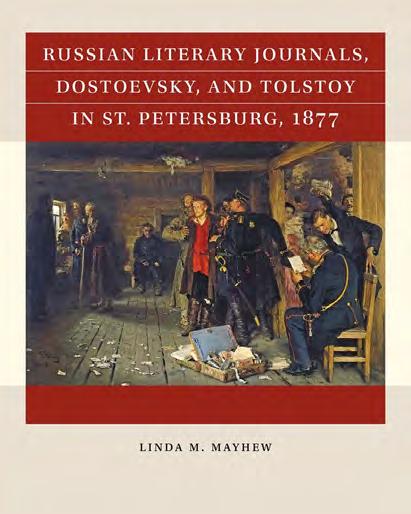
October 2025
$30.00 s
ISBN: 9781469691381
Paperback
168 pages
2 halftones, 1 maps, 2 tables, appends., notes, bibl.
10.000 in H | 8.000 in W | 1.000 inT
History / Europe
Reacting to the Past™
Derrick E. White
Thetransformationofblackcollege football fromthegoldenageto integration
Black college football began during the nadir of African American life after the Civil War. The first game occurred in 1892, a little less than four years before the Supreme Court ruled segregation legal inPlessyv.Ferguson. In spite of Jim Crow segregation, Black colleges produced some of the best football programs in the country. They mentored young men who became teachers, preachers, lawyers, and doctors not to mention many other professions and transformed Black communities. But when higher education was integrated, the programs faced existential challenges as predominately white institutions steadily set about recruiting their student athletes and hiring their coaches. Blood,Sweat,andTearsexplores the legacy of Black college football, with Florida A&M’s Jake Gaither as its central character, one of the most successful coaches in its history. A paradoxical figure, Gaither led one of the most respected Black college football programs, yet many questioned his loyalties during the height of the civil rights movement.
Among the first broad-based histories of Black college athletics, Derrick E. White’s sweeping story complicates the heroic narrative of integration and grapples with the complexities and contradictions of one of the most important sources of Black pride in the twentieth century.
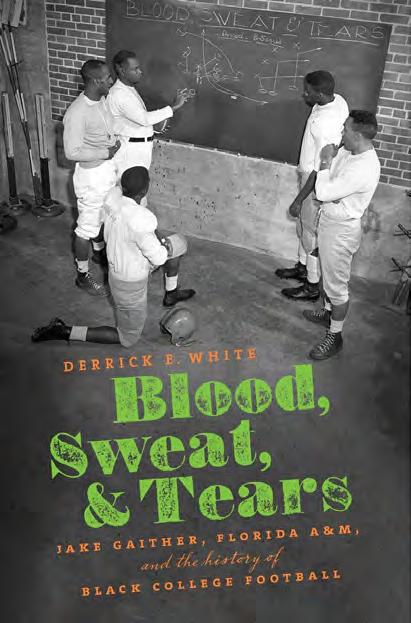
August 2025
$29.95 s ISBN: 9781469692104
Paperback
320 pages 22 halftones, 2 tables, notes, bibl., index 9.250 in H | 6.120 in W | 1.000 inT
History/AfricanAmerican
Derrick E. White isprofessorofhistoryattheUniversityofKentucky.
“Superior analysis, beautiful writing, and contextual depth. . . . [T]he best book on HBCU football I’ve come across.”
AmericanHistoricalReview
“A vital piece of scholarship that extends the field of Black sports history and convincingly demonstrates that athletic integration had significant costs, including the way it has obscured the long and rich history of Black sporting institutions.”
JournalofAfricanAmericanHistory
“This fascinating social history effectively uses mid-twentieth-century Black college football as a microcosm through which one can understand the larger civil rights struggle. An important contribution to social history.”
Booklist
“A valuable resource for future scholars and for anyone interested in black college football.”
LibraryJournal
JamesLivingston
Whatcomesafterworkasweknowit?
For centuries we've believed that work was where you learned discipline, initiative, honesty, self-reliance—in a word, character. A job was also, and not incidentally, thesourceofyourincome:ifyoudidn’twork,youdidn’teat,or else you were stealing from someone. If only you worked hard, you could earn your way and maybe even make something of yourself.
Inrecentdecades,througheverydayexperience,thesebeliefshaveproven spectacularly false. In this book, James Livingston explains how and why Americans still cling to work as a solution rather than a problem—why it is that both liberals and conservatives announce that “full employment” is their goal when job creation is no longer a feasible solution for any problem, moral or economic. The result is a witty, stirring denunciation of the ways we think about why we labor, exhorting us to imagine a new way of finding meaning, character, and sustenance beyond our workaday world—and showing us that we can afford to leave that world behind.
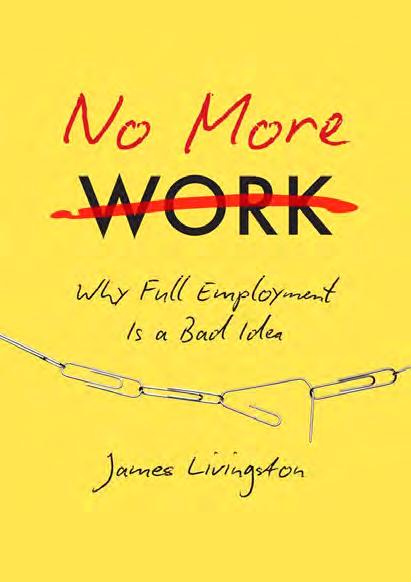
August 2025
$20.00 s ISBN: 9781469692081
Paperback
128 pages
7.000 in H | 5.000 in W | 1.000 inT
Business & Economics / Economics
James Livingston is professor emeritus of history at Rutgers University–New Brunswick. He is the author of five other books on topics ranging from the Federal Reserve System toSouthPark
“Unrivaled . . . in its audacity and brashness, all in a delightfully amusing little essay that is guaranteed to delight undergrads and provoke them to question their individual collective future. Highly recommended.”
“Pack[s] a verbal blow against all those—on the Right and the Left—who continue to kneel in adoration in the Chapelof Work.”
DissidentVoices
“Livingston is at his most persuasive as a historian. . . . NoMoreWorkseek[s] to solve the problem of work through resource redistribution rather than by inviting readers to hack their own lives.” PublicBooks
WilliamA.Link
Theinfluentiallifeofaneducator,political leader,andglobal peacemaker
Frank Porter Graham (1886–1972) was one of the most consequential white southerners of the twentieth century. Born in Fayetteville and raised in Charlotte, Graham became an active and popular student leader at the University of North Carolina. After earning a graduate degree from Columbia University and serving as a marine during World War I, he taught history at UNC, and in 1930, he became the university’s fifteenth president. Affectionately known as “Dr. Frank,” Graham spent two decades overseeing UNC’s development into a world-class public institution. But he regularly faced controversy, especially as he was increasingly drawn into national leadership on matters such as intellectual freedom and the rights of workers. As a southern liberal, Graham became a prominent New Dealer and negotiator and briefly a U.S. senator. Graham’s reputation for problem solving through compromise led him into service under several presidents as a United Nations mediator, and he was outspoken as a white southerner regarding civil rights.
Brimming with fresh insights, this definitive biography reveals how a personally modest public servant took his place on the national and world stage and, along the way, helped transform North Carolina.
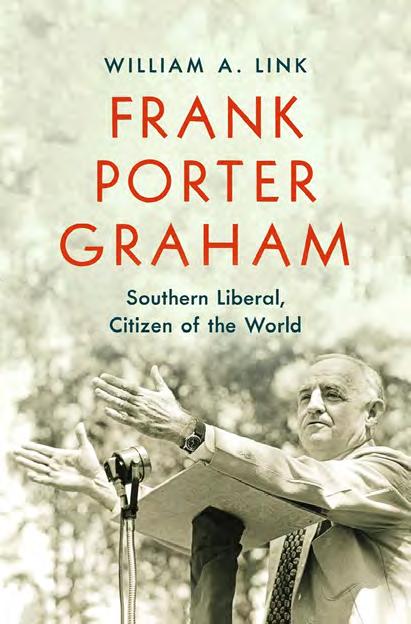
$29.95 s ISBN: 9781469692067
Paperback
384 pages
30 halftones, notes, bibl. 9.250 in H | 6.120 in W | 1.000 inT
History / United States
William A. Link is Richard J. Milbauer Professor of History at the University of Florida.
“In [this] well-researched biography, [Frank Porter] Graham emerges as more complex and human, and his career exposes the limitations of white liberalism in the post–World War II South. . . . A well-crafted and thoughtful account.”
JournalofSouthernHistory
“An engaging and important book. . . . [T]his biography offers important lessons for how one man navigated the complexities of racism, higher education, politics, labor relations, and internationalism during mid-twentieth-century America.”
JournalofAmericanHistory
Aesthetic Violence in American Literature and Art, 1945–2001
Anna Ioanes
Unsettlingartunsettlesournormalizationofviolence
In the wake of World War II, Americans struggled to grasp the shifting scale of violence brought on by the nuclear era. To grapple with the overwhelming suffering of the sociopolitical moment, new ways of thinking about violence—as structural, systemic, and senseless—emerged. Artists and writers, however, challenged the cultural impulse to make sense of these new horrors, mobilizing what Anna Ioanes calls “aesthetic violence.” Searching for the strategies artists employed to resist the normalization of new forms of crushing violence, Ioanes examines the works of major cultural figures, including Kara Walker, James Baldwin, Andy Warhol, Yoko Ono, and Toni Morrison, and lesser-known artists such as playwright MaryatLeeandriotgrrrlfigureKathleenHanna.
Grounded in close reading, archival research, and theories of affect, aesthetics, and identity,PainfulFormsshows that artists employed forms that shortcircuited familiar interpretive strategies for making sense of suffering, and as a result, defamiliarized common sense notions that sought to naturalize statesanctioned violence. Rather than pulling heartstrings, stoking outrage, or straightforwardly critiquing injustice, Ioanes argues that aesthetic violence forecloses catharsis, maintains ambiguities, and refuses to fully make sense, allowing audiences to experience new ways of thinking, feeling, and knowing about suffering.
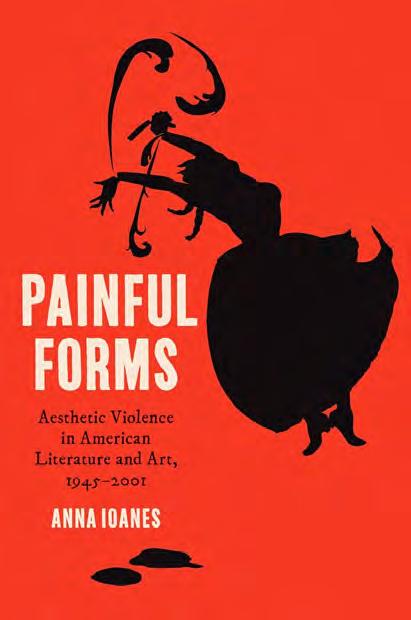
October 2025
$34.95 s
ISBN: 9781469688947
Paperback
224 pages
6 halftones
9.250 in H | 6.120 in W | 1.000 inT
Social Science / Violence in Society
“Ioanes stages a dialogue between literary texts and artwork to produce rich insights into the relationship between violence,aesthetics,andAmericanartandliteratureofthelatetwentiethcentury.Asignificantcontribution.” Stephanie Li, Duke University
Argentina, Colombia, Costa Rica, and Mexico
Jordi Díez
ComparingabortionpoliticsinthecourtsofLatinAmerica
Latin America has traditionally imposed the strictest limits on legal abortionin thedemocraticworld,butoverthelasttwentyyears, constitutional courts across the region have issued important rulings on its regulation. InTheJudicial PoliticsofAbortioninLatinAmerica,JordiDíez analyzes four landmark cases in Argentina, Colombia, Costa Rica, and Mexico. Based on research in all four countries, including interviews with high court justices and law clerks, Díez argues that the decisions' variance is explained by two main factors: justices' and law clerks' ability to assemble legal majorities in favor of reducing abortion restrictions, and each country’s unique political landscape. As debates about a woman’s right to choose unfold around the world, Díez offers important and timely lessons from Latin America.

November 2025
$39.95 s
ISBN: 9781469689746
Paperback
336 Pages pages
1 figs., 2 tables
9.250 in H | 6.120 in W | 1.000 inT
Social Science / Ethnic Studies
Jordi Díez is professor of political science at the University of Guelph.
“Jordi Díez expertly illuminates the complex inner workings of judicial decision-making on abortion in Latin America.”
—JaneMarcus-Delgado,CollegeofStatenIsland,CityUniversityofNewYork
“This work fills an important gap in our substantive knowledge of abortion and the courts in Latin America more broadly.”
—ChristinaEwig,UniversityofMinnesota
Jess Libow
Thehistoryofwomenwritingabouthealth
Nineteenth-century America saw profound changes in the ways people viewed their bodies, their health, and their corporeal connection to their environments. Though much of the writing about bodies was produced by men, Vigorous Reforms focuses on the understudied literary history of how women came to understand physicality and its connection to their everyday lives. The introduction of physical education allowed women to conceive their own and others' bodies not as static entities, but as adaptable to their own needs, goals, and labor. Jess Libow also shows the limits of the science of the era—since bodily differences were often understood as biologically determined, theories of health defined womanhood in terms of racialized bodily abilities. For example, settler colonial ideology coded Native women as deteriorating due to their “uncivilized” ways of life, and proponents of slavery insisted that Black women’s inherent strength made them suitable for enslavement.
Drawing on a wide-ranging archive of ideas about exercise, hygiene, and nutrition, Libow argues that women’s writing about health was fundamental to the development of what we now think of as American feminism.
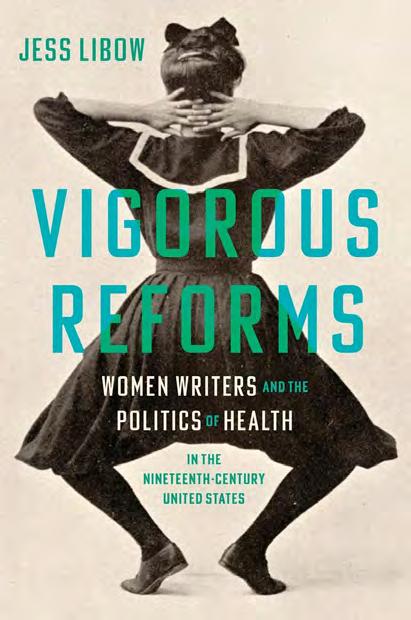
$32.95 s ISBN: 9781469689036
Paperback 216 pages 3 halftones
9.250 in H | 6.120 in W | 1.000 inT
Literary Criticism / Women Authors
Jess Libow is interim director of the writing program and visiting assistant professor at Haverford College.
“Bringing into focus for the first time the extent to which nineteenth-century women writers infused health with political significance, Jess Libow has given the field a beautifully written, eloquent book that exposes the ideological work of physical education, especially as it concerns nation-building and white supremacy. An impressive achievement.”
—Sari Edelstein, University of Massachusetts, Boston
“Jess Libow delivers a much-needed analysis of the impact of physical education on women reformers and their interventions in debates about citizenship. A well-written text that I see becoming an important reference for scholars of nineteenth-century American history and culture, women’s history, and history of medicine.”
—Sara Crosby,TheOhioStateUniversity
Andrew Kopec
Howcapitalismchangednineteenth-centuryliterature
Peoplelivinginthenineteenth-centuryUnitedStatessawshockingupheavalsinboth theeconomyandinideasofselfhoodinacommercialsociety.Narrativessuchas HoratioAlger'srags-to-richestalesalluredAmericanswithvisionsoffinancial success,whileeventssuchasthePanicsof1819,1837,1857,and1865threatenedthem withsuddenanddevastatingfinancialfailure.Theantebellumperiod's"go-ahead" ethosencouragedindividualstoformanidentityamidthischaosbystrivingfor financialsuccessthroughrisk-taking—thatis,toformacapitalistself.AndrewKopec arguesthatwritersofthiserawerenotimmunetothisbusinessturbulence;rather, theirresponsestoitshapedthedevelopmentofAmericanliterature.Byexamining thepublicandprivatewritingsofwell-knownAmericanwriters—including WashingtonIrving,CatharineMariaSedgwick,NathanielHawthorne,Herman Melville,andFrederickDouglass—Kopeccontendsthat,insteadofanxiously retreatingfromthevolatilemarket,thesefiguresdeliberatelyengagedwithitintheir writing.
Thesewritersgrappledwithboththelimitsandopportunitiesofcapitalistselfhood andtried,invariousways,toharnesstheeconomy'senergiesforthebenefitofthe self.Inmakingthisargument,Kopecinvitesreaderstoconsiderhowthiseraof Americanliteraturequestionedtheideologiesofcapitalistidentitythatseem inescapabletoday.

September 2025
$29.95 s
ISBN: 9781469690179
Paperback
208 pages
7 halftones, notes, bibl.
9.250 in H | 6.120 in W | 1.000 in T
Literary Criticism / Modern
Andrew Kopec isassociateprofessorofEnglishatPurdueUniversityFortWayne.
“Andrew Kopec fills an inexplicable gap in the cultural history of US financial crisis by concentrating on one of the most rapid expansionary periods in the history of capitalism. In his book, he wisely rejects that cliché about the financial psyche—which forgets the lessons of crisis as soon as the crisis is over—and emphasizes how chaotic phases of financialization impact market actors during long periods of relative stability, making the financialized self not an aberration, but the norm for antebellum Americans.”
—Matt Seybold, Elmira College
ShayneA.P.Dahl
Anancientmountainreligionconfrontsdisasteranduncertaintyin contemporaryJapan
InthiscompellingnarrativeofdiscoverysetinJapan'sremoteDewaSanzanmountain range,ShayneA.P.DahldescribesShugendō,asecretivereligioustraditionthat combinesaspectsofShinto,Buddhism,andmountainworship.Asaparticipantobserver,Dahlinvitesreadersintothepracticesofcontemporaryasceticswhoseethe sacredmountainsaswombswithinwhichcyclesoflife,death,andrebirthcanbe harnessedforthesakeofpersonaltransformationandexistentialrealization.AsDahl argues,immersioninShugendōprovidesasceticsandpilgrimswithanescapefrom capitalistmodernityandanavenueforself-reflectioninthewakeoftheearthquake, tsunami,andnucleardisasternearFukushimainMarch2011.
ImmersingreadersintheintimateandhiddendimensionsofShugendō,Dahlsheds lightonhowpractitionerssustaintheirtraditionsinthefaceofmoderntemptations andtensionswithintheirreligiouscommunities.FilledwithinsightintoShugendō’s contributiontoJapaneseculturalidentity,thisbookoffersgroundbreakingperspective ontheintersectionsofecology,disaster,religion,thehumancondition,anddeath.

November 2025
$34.95 s ISBN: 9781469690605
Paperback
272 pages
19 halftones, 1 maps, bibl., index
9.250 in H | 6.120 in W | 1.000 inT
Religion / Eastern
Where Religion Lives
ShayneA.P.DahlisananthropologistwhoearnedhisdoctorateattheUniversityof TorontoandhasheldpostdoctoralfellowshipsatHarvardUniversity,McMaster University,andtheUniversityofLethbridge.
“Shayne Dahl’s study employs a strong ethnographic methodology and balances theoretical sophistication with narrative flow, making it a highly readable and valuable engagement with contemporary Shugendo and Japanese religions. The book makes meaningful contributions to the fields of anthropology and religion and will spark conversations in undergraduate and graduate classrooms.”
—Caleb Carter, Kyushu University
J.Tom Mueller
Rural America is at a crossroads: either it will manage to sustain itself long-term, or—as current trends suggest—it will continue to disappear through depopulation and urbanization. There have been calls for economic redevelopment, but even with these proposals, J. Tom Mueller argues that policymakers, politicians, and academics rarely make a clear case for why rural America matters and is worth saving in the first place. In this provocative book, Mueller meets these issues head-on by presenting a critique of conventional economic development efforts while also articulating why rural America is worthy of preservation.
The Case for Rural America outlines the actions necessary to save our rural places and the people who live there. By suggesting approaches that would benefit urban populations as well as rural—such as establishing a universal basic income and implementing single-payer healthcare—Mueller offers a nuanced understanding of the complex needs of rural America while providing solutions that would benefit us all.

October 2025
$27.95 s ISBN: 9781469691527
Paperback
192 pages 2 maps, 1 table 9.250 in H | 6.120 in W | 1.000 in T
Social Science / Sociology
Rural Studies Series
J.Tom Mueller is assistant professor of population health and director of the Kansas Center for Rural Health at the University of Kansas Medical Center.
“An impressive analysis of what ails rural America and what can save it. It’s clear J. Tom Mueller is invested in rural places and people and his advocacy transcends mere policy suggestions. A much-needed intervention.”
—Justin Farrell, Yale University






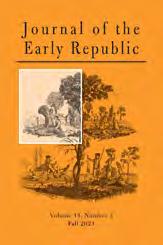
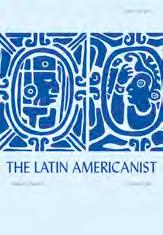

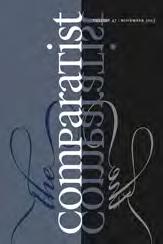



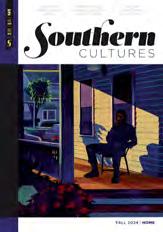

For more information about our journals, please contact our Journals Manager or scan the QR code to visit our website.

stacy.lavin@uncpress.org www.uncpress.org/journals

All books in this catalog are available on uncpress.org, through bookstores, or directly from Longleaf Services.

uncpress.org/how-to-order

Longleaf Services, an affiliate of UNC Press, was formed to provide cost-effective fulfillment services for not-for-profit publishers.
www.longleafservices.org
Longleaf Services, Inc.
116 S. Boundary St. Chapel Hill, NC 27514-3808
P: 800-848-6224
F: 800-272-6817
customerservice@longleafservices.org
Order through Edelweiss: edelweiss.abovethetreeline.com
Bookseller Discount Codes Pubnet
Discount Schedules may be found in the ABA Handbook or obtained from your sales rep or the publisher.
Trade: t
Short s
Text: x
Longleaf SAN: 2033151
Please confirm account information with us (800848-6224) before submitting your first PUBNET order.
Elizabeth Orange Lane
Assistant Sales Manager, UNC Press 919-918-5885 elizabeth.orange@uncpress.org
United States: Columbia University Press Sales Consortium
VA, WV, TN, NC, SC, GA, FL, AL, MS, AR, LA, TX

Permission to return overstock is not required provided books are returned within 18 months of sale. Books must be clean, undamaged, and saleable copies of titles currently in-print as listed on our website. Full credit allowed if customer supplies copy of original invoice or correct invoice number; otherwise, maximum discount applies.
Returns of OP titles accepted within 6 months after notification. Please send carefully packaged books prepaid via traceable method to our warehouse: Longleaf Returns
c/o Ingram Distribution Solutions 1280 Ingram Drive Chambersburg, PA 17202
Media Inquiries For Educators
DE, MD, PA
ME, VT, NH, MA, CT, RI, NY, NJ
AK, AZ, CA, HI, ID, MT, NV, NM, OR, UT, WA
CO, IL, IN, IO, KA, KY, MI, MN, MO, NE, ND, OH, OK, SD, WI, WY
Canada
Catherine Hobbs Sales Consortium Manager & Southern US Representative 804-690-8529 | ch2714@columbia.edu
Sam Jaffe Goldstein Mid-Atlantic Sales Representative 347-645-3949 | sj3176@columbia.edu
Conor Broughan Northeastern US Sales Rep 917-826-7676 | cb2476@columbia.edu
William Gawronski Western US Sales Representative 310-488-9059 | wgawronski@columbia.edu
Kevin Kurtz Midwestern US Sales Representative 773-316-1116 | kk2841@columbia.edu
Send orders to: UTP Distribution utpbooks@utpress.utoronto.ca 5201 Dufferin St · Toronto, ON · M3H 5T8 · CANADA Telephone: 1.800.565.9523 Fax: 1.800.221.9985 www.utpdistribution.com
Sales Representation
Ampersand – Head Office Suite 213 321 Carlaw St., Toronto, ON · M4M 2S1 · CANADA Toll Free: 866-736-5620 Fax: 866-849-3819
UK, Ireland, Continental Europe, Middle East, Africa, Australia & NZ, Latin American & Caribbean
Mare Nostrum Group 39 East Parade Harrogate North Yorkshire HG1 5LQ United Kingdom
Trade Orders & Enquiries:
Email: trade@wiley.com
Tel: +44 (0)1243 843291
Individual Orders & Enquiries: Orders should be placed through your local bookstore, an online retailer, or via email: mng.csd@wiley.com
john.mcleod@uncpress.org uncpress.org/for-educators publicity@uncpress.org

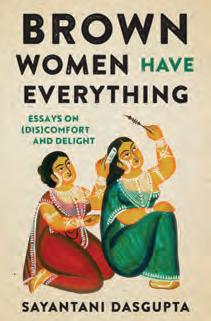
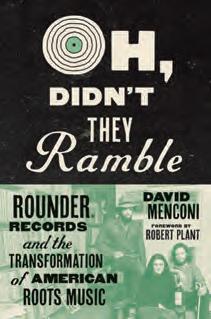

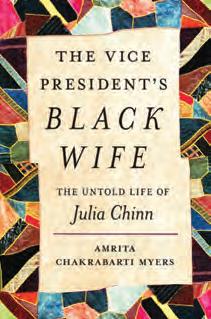

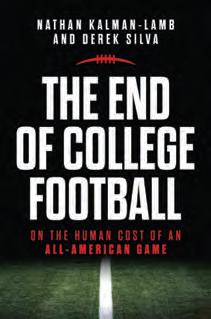
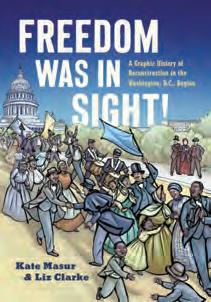

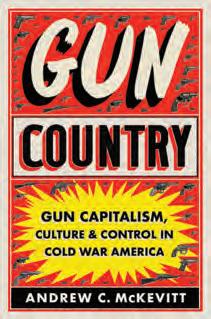
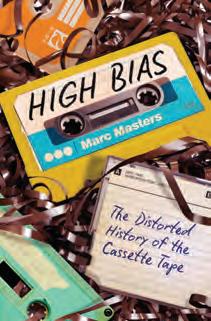


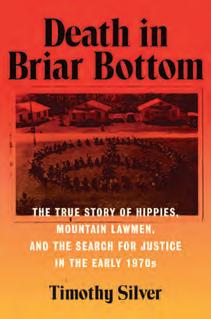


Brown and Blue: Mexican Americans, Law Enforcement, and Civil Rights in the Southwest, 1935–2025
Canal Dreamers: The Epic Quest to Connect the Atlantic and Pacific in he
Caught in the Current: Mexico’s Struggle to Regulate Emigration, 1940–1980 27 Chasing Bandits: America’s Long War on Terror
47 City of Lyrics: Ordinar y Poets and Islamicate Popular Culture in Early Modern Delhi
53 Clenched Fists, Burning Crosses: A Novel 28 Counting the Cost of Freedom: The Fight Over Compensated Emancipation a�er the Civil War
45 Craig Thurtell
5 Crayfih, Crawfi h, Crawdad: The Biology and Conservation of North America’s Favorite Crustaceans
53 Cris South and Jaime Harker
2 Custom Made Woman: A Life in Traditional Music
49 Damned Whiteness: How White Christian Allies Failed the Black Freedom Movement
49 David F. Evans
57 Derrick E. White
41 Dictatorship across Borders: Brazil, Chile, and the South American Cold War
31 Erika Pani
4 Fearless, Sleepless, Deathless: What Fungi Taught Me about Nourishment, Poison, Ecology, Hidden Histories, Zombies, and Black Survival
32 Fernando Armstrong-Fumero
34 Fighting with the Past: How Seventeenth-Century History Shaped the American Civil War
51 Folk Engineering: Planning Southern Regionalism 37 For a Spell: Sissie Collectivism and Radical Witchery in the Southeast
Frank Porter Graham: Southern Liberal, Citizen of the World
Free-Range Religion: Alternative Food Movements and Religious Life in the United States
From Enslavement to COVID-19: A History of
Rise of a Critical Press since the 1980s
Law: Policing and Reform in America’s Jim Crow Countryside
More Work: Why Full Employment Is a Bad Idea
Memory: Recording Sound, Performing Archives
Return: Mapping Memory and Storytelling in
America’s First Opioid
Piccato and Quentin Pope 60
Painful Forms: Aesthetic Violence in American Literature and Art, 1945–2001
Rana Barakat
Reclaiming Clio: Making American Women’s History, 1900-2000
René Esparza 21 Requiem for Reconstruction: Black Countermemory and the Legacy of the Lowcountry’s Lost Political Generation 32
Roads to Prosperity and Ruin: Infrastructure and the Making of Neoliberal Y ucatán
Robert D. Bland
Rosemary Ndubuizu
Russian Literary Journals, Dostoevsky, and Tolstoy in St. Petersburg, 1877
6 Sanctioned Savager y: A History of Violence in American Football 8
Sandra A. Gutierrez
Sarah Jones Weicksel
35
26
Sex and the O��e: A Histor y of Gender, Power, and Desire 64
45
63
Shayne A. P. Dahl
Short of a Revolution: The Fusion Insurgency and the Triumph of Jim Crow in North Carolina
Sink or Swim: Capitalist Selfhood and ineteenth-Century American Literature
51 Stephen J. Ramos
3 Sylvester Allen Jr. and Belle Boggs
23
Take Freedom: Recovering the Fugitive History of the Denmark Vesey A�air
17 The Bitterweed Path: A Rediscovered Novel
14
30
The Fate of the Americas: The Cuban Missile Crisis and the Hemispheric Cold War
The Home Front: Revolutionary Households, Military Occupation, and the Making of American Independence
20 The Reconstruction Diary of Frances Anne Rollin: A Critical Edition
33
The Surgeon’s Battle: How Medicine Won the Vicksburg Campaign and Changed the Civil War
25 The Undesirable Many: Black Women and Their Struggles against Displacement and Housing Insecurity in the Nation’s Capital
65 The Case for Rural America
61
The Judicial Politics of Abortion in Latin America: Argentina, Colombia, Costa Rica, and Mexico
3 The Legend of Wyatt Outlaw: From Reconstruction through Black Lives Matter
8
64
The New Southern-Latino Table: Recipes That Bring Together the Bold and Beloved Flavors of Latin America and the American South
The Secret World of Shugendō: Sacred Mountains and the Search for Meaning in Post-Disaster Japan
7 The Vice President’s Black Wife: The Untold Life of Julia Chinn
17
31
62
5
Thomas Hal Phillips, John Howard and Harry Thomas Jr.
Torn Asunder: Republican Crises and Civil Wars in the United States and Mexico, 1848–1867
Vigorous Reforms: Women Writers and the Politics of Health in the Nineteenth-Century United States
59 William A. Link
15
William J. Schultz
Zackary A. Graham





